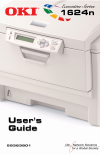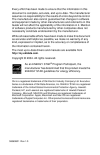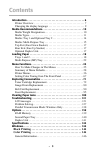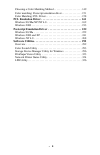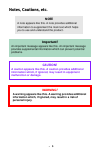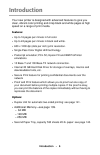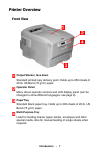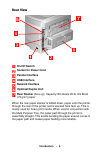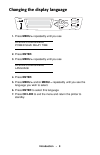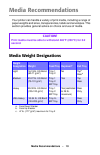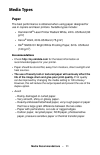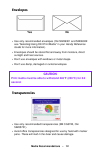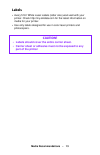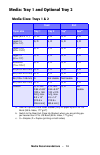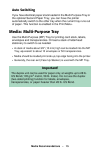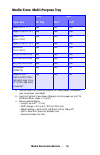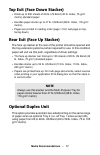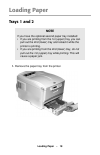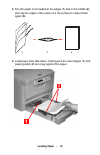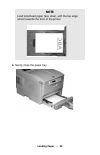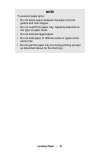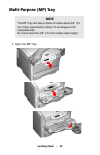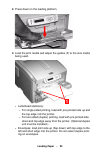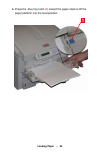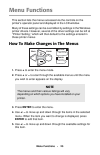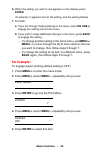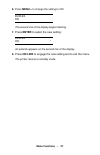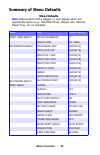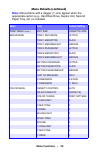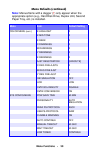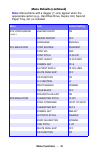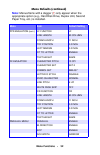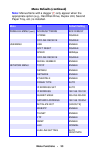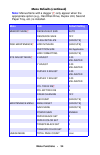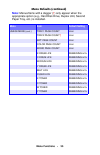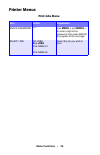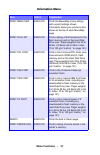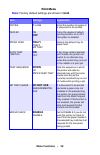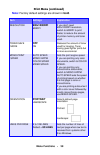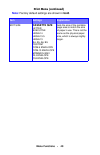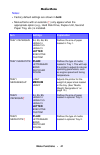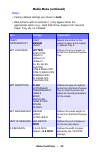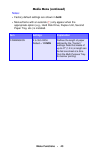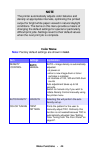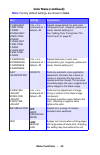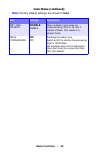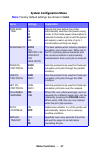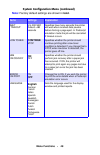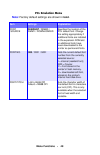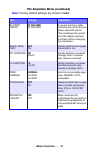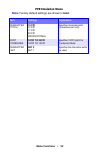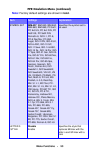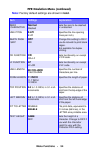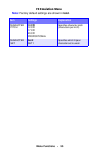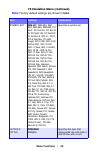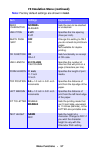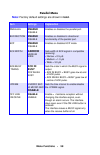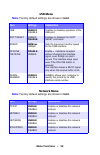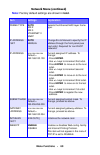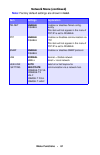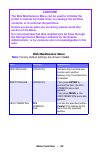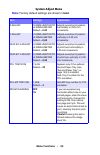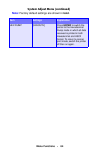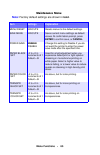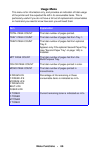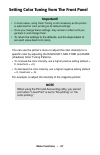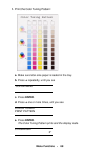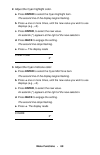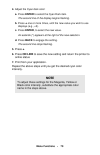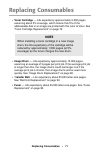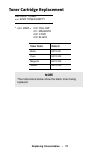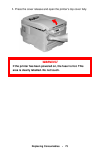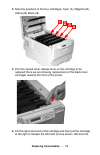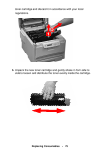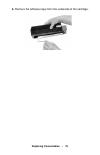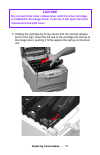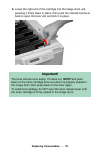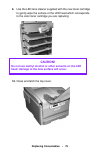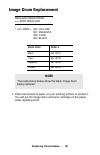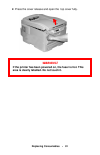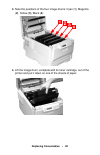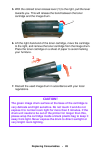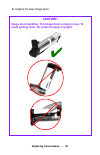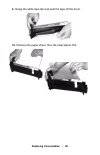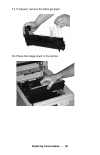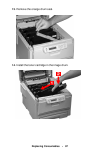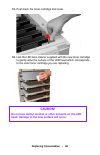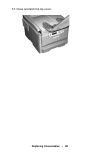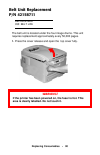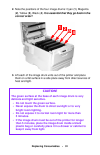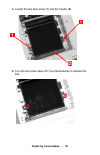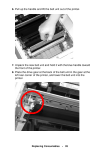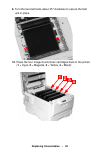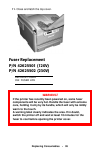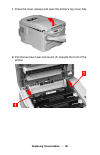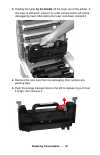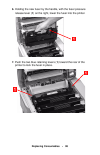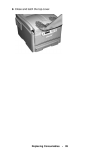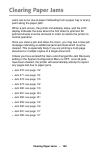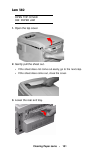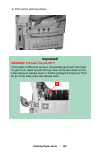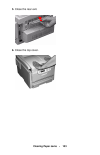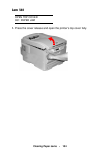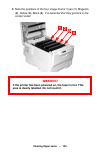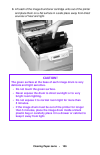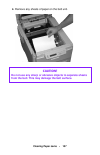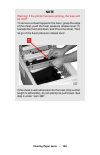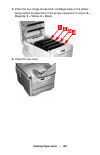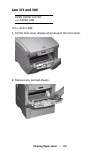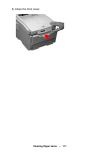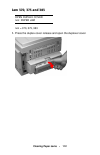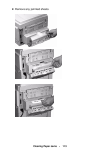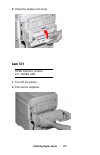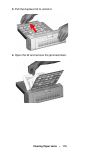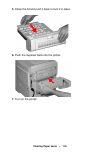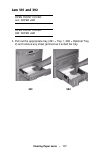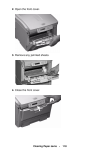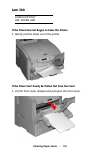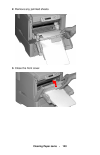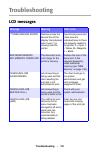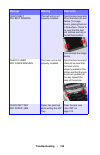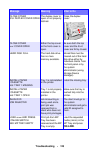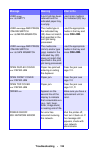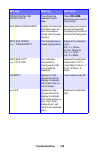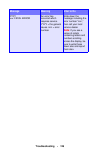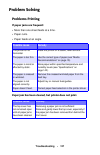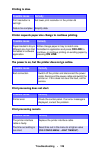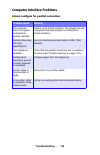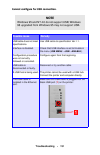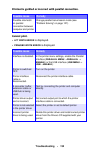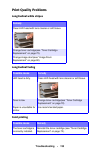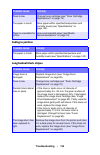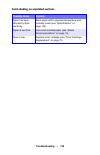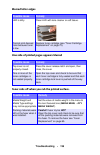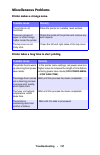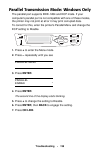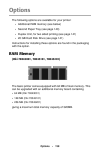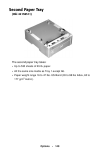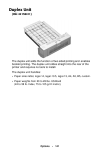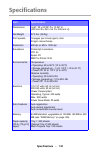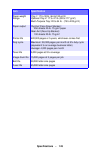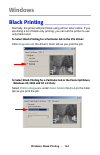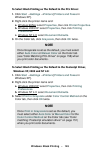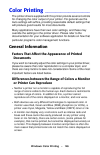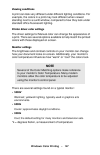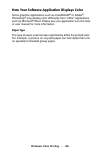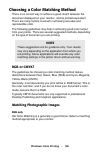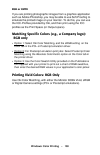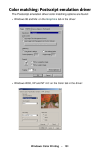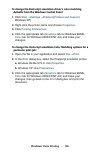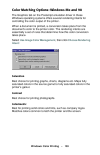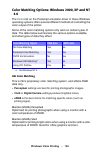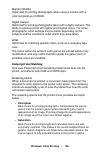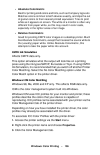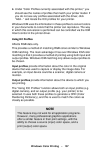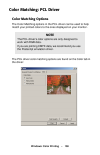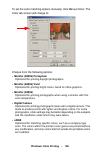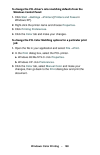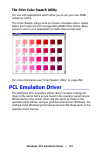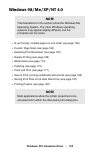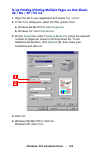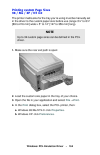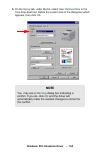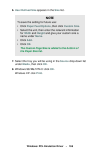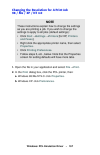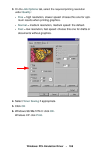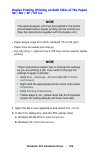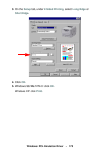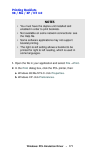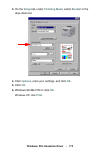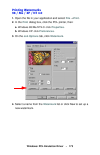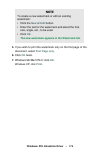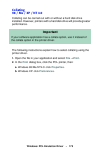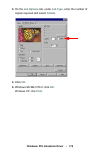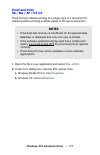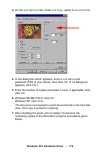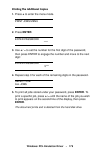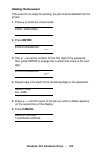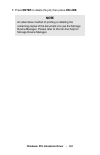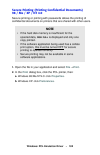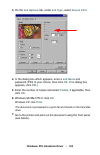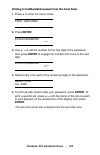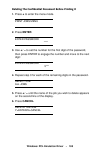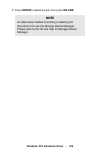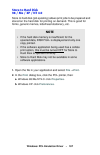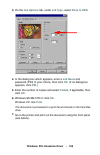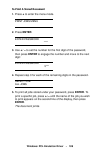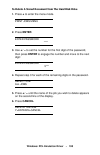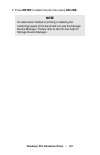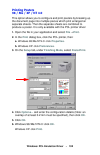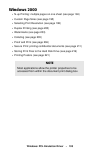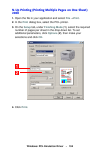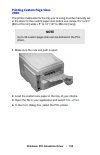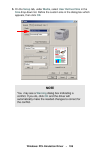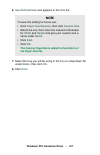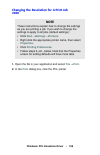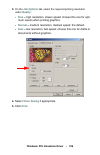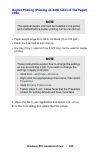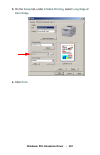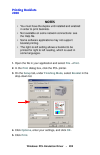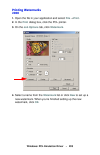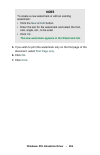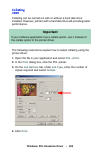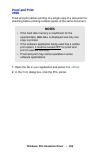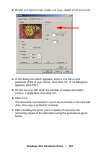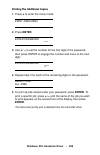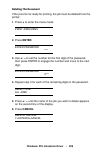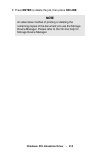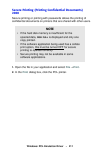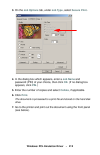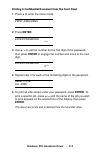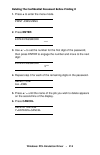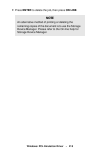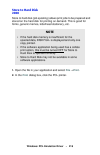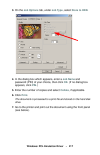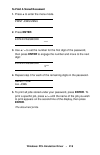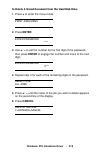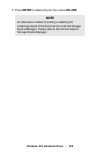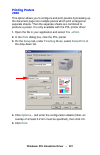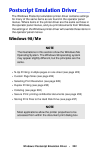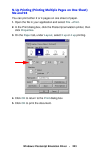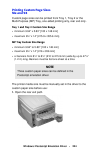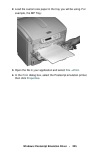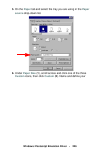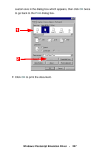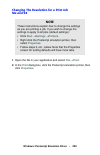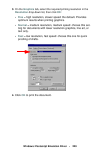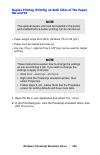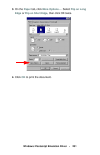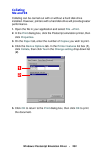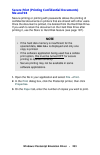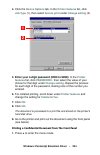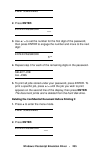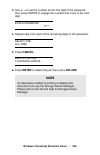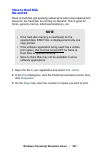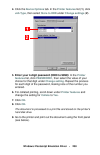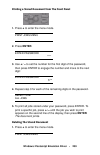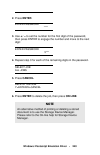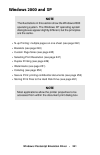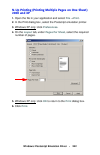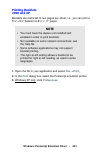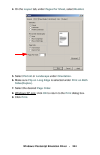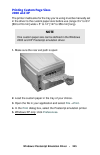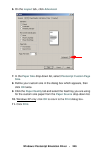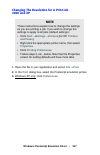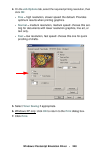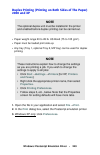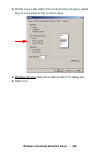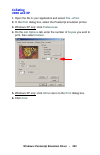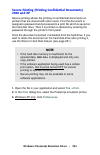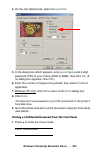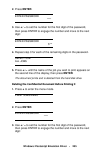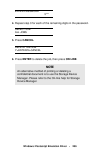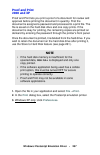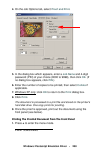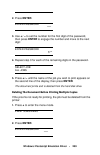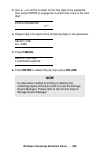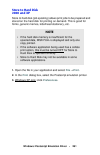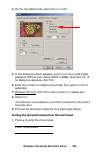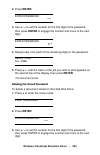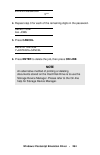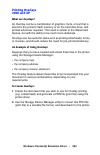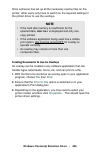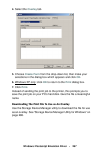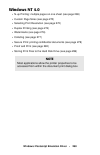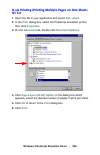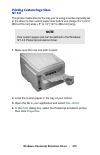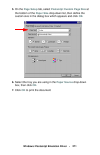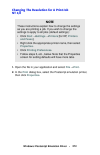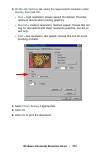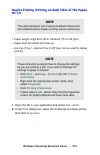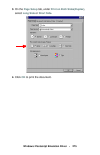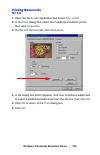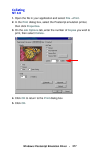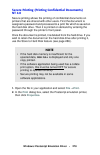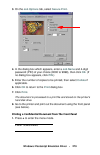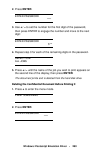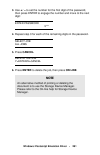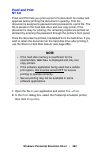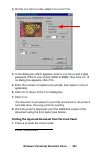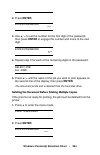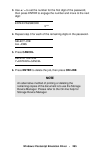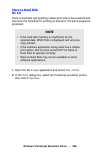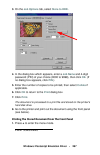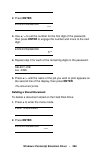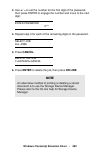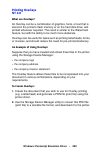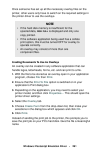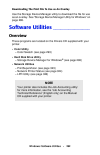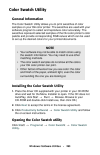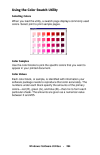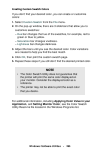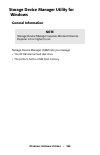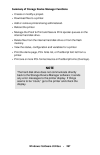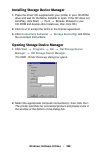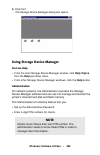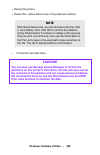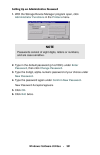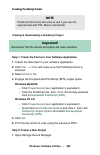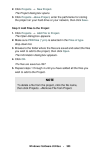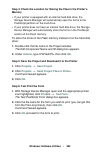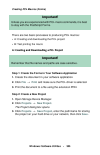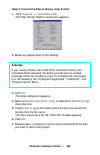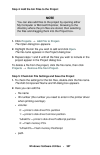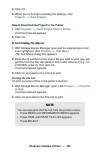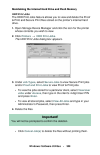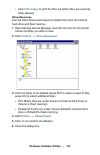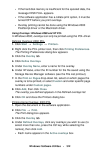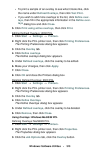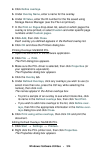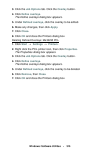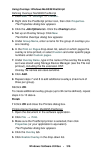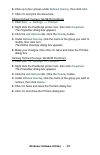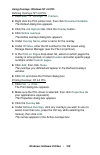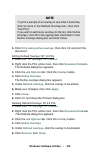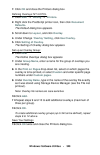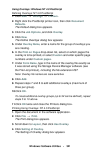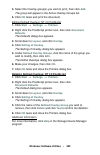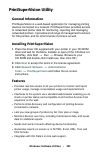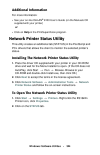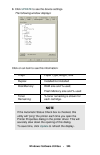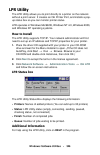- DL manuals
- Oki
- All in One Printer
- ES 1624n MFP
- User Manual
Oki ES 1624n MFP User Manual
Summary of ES 1624n MFP
Page 2: Http://my.Okidata.Com
Every effort has been made to ensure that the information in this document is complete, accurate, and up-to-date. The manufacturer assumes no responsibility for the results of errors beyond its control. The manufacturer also cannot guarantee that changes in software and equipment made by other manuf...
Page 3: •
• 3 contents introduction . . . . . . . . . . . . . . . . . . . . . . . . . . . . . . . . . . . . . . . . . . 6 printer overview . . . . . . . . . . . . . . . . . . . . . . . . . . . . . . . . . . . . . . 7 changing the display language . . . . . . . . . . . . . . . . . . . . . . . . . . . 9 media r...
Page 4: •
• 4 choosing a color matching method . . . . . . . . . . . . . . . . . . . . . 149 color matching: postscript emulation driver . . . . . . . . . . . . . . . 151 color matching: pcl driver . . . . . . . . . . . . . . . . . . . . . . . . . . . 158 pcl emulation driver . . . . . . . . . . . . . . . . ....
Page 5: •
• 5 notes, cautions, etc. Note a note appears like this. A note provides additional information to supplement the main text which helps you to use and understand the product. Important! An important message appears like this. An important message provides supplemental information which can prevent p...
Page 6: Introduction
Introduction • 6 introduction your new printer is designed with advanced features to give you clear, vibrant color printing and crisp black and white pages at high speed on a range of print media. Features: • up to 16 pages per minute in full color. • up to 24 pages per minute in black and white. • ...
Page 7: Introduction
Introduction • 7 printer overview front view output stacker, face down standard printed copy delivery point. Holds up to 250 sheets of 20-lb. Us bond (75 g/m²) paper. Operator panel menu driven operator controls and lcd display panel (can be changed to show different languages: see page 9). Papertra...
Page 8: Introduction
Introduction • 8 rear view on/off switch socket for power cord parallel interface usb interface network interface optional duplex unit rear stacker (face up), capacity100 sheets 20-lb. Us bond (75 g/m²) paper when the rear paper stacker is folded down, paper exits the printer through the rear of the...
Page 9: Introduction
Introduction • 9 changing the display language 1. Press menu + repeatedly until you see system config menu power save delay time 2. Press enter. 3. Press menu + repeatedly until you see system config menu language 4. Press enter. 5. Press menu + and/or menu – repeatedly until you see the language yo...
Page 10: Media Recommendations
Media recommendations • 10 media recommendations your printer can handle a variety of print media, including a range of paper weights and sizes, transparencies, labels and envelopes. This section provides general advice on choice and use of media. Media weight designations caution! Print media must ...
Page 11: Media Recommendations
Media recommendations • 11 media types paper the best performance is obtained when using paper designed for use in copiers and laser printers. Suitable types include: • hammermill ® laser printer radiant white, 24 lb. Us bond (90 g/m²) • xerox ® 4024, 20 lb.Us bond (75 g/m²) • oki ® 52206101 bright ...
Page 12: Media Recommendations
Media recommendations • 12 envelopes • use only recommended envelopes (oki 52206301 and 52206302: see “selecting/using oki print media“ in your handy reference guide for more information). • envelopes should be stored flat and away from moisture, direct sunlight and heat sources. • don’t use envelop...
Page 13: Media Recommendations
Media recommendations • 13 labels • avery 5161 white laser labels (letter size) work well with your printer. Check http://my.Okidata.Com for the latest information on media for your printer. • use only labels designed for use in color laser printers and photocopiers. Caution! • labels should cover t...
Page 14: Media Recommendations
Media recommendations • 14 media: tray 1 and optional tray 2 media sizes: trays 1 & 2 feed exit paper size tray 1 tray 2 top a a. Use the top exit (face down stacker) only for paper up to 47 lb. Us bond (98 lb. Index, 177 g/m 2 ). Rear b b. Switch to the rear exit (face up stacker) when you are prin...
Page 15: Media Recommendations
Media recommendations • 15 auto switching if you have identical paper stock loaded in the multi-purpose tray or the optional second paper tray, you can have the printer automatically switch to the other tray when the current tray runs out of paper. This function is enabled in the print menu. Media: ...
Page 16: Media Recommendations
Media recommendations • 16 media sizes: multi-purpose tray feed exit paper size mp tray rear a a. Use the rear exit (face up stacker) for heavy paper, transparen- cies, envelopes, and labels. Top b b. Use the top exit (face down stacker) only for paper up to 47 lb. Us bond (98 lb. Index, 177 g/m 2 )...
Page 17: Media Recommendations
Media recommendations • 17 top exit (face down stacker) • holds up to 250 sheets of 20-lb. Us bond (42 lb. Index, 75 g/m² metric) standard paper • handles paper stocks up to 47 lb. Us bond (98 lb. Index, 176 g/m² metric). • pages are printed in reading order (page 1 first; last page on top, facing d...
Page 18: Loading Paper
Loading paper • 18 loading paper trays 1 and 2 1. Remove the paper tray from the printer. Note if you have the optional second paper tray installed: • if you are printing from the 1st (upper) tray, you can pull out the 2nd (lower) tray and reload it while the printer is printing. • if you are printi...
Page 19: Loading Paper
Loading paper • 19 2. Fan the paper to be loaded at the edges (1) and in the middle (2), then tap the edges of the stack on a flat surface to make it flush again (3). 3. Load paper print side down, making sure the rear stopper (1) and paper guides (2) are snug against the paper. 1 2 3.
Page 20: Loading Paper
Loading paper • 20 4. Gently close the paper tray. Note load letterhead paper face down, with the top edge aimed towards the front of the printer..
Page 21: Loading Paper
Loading paper • 21 note to prevent paper jams: • do not leave space between the paper and the guides and rear stopper. • do not overfill the paper tray. Capacity depends on the type of paper stock. • do not load damaged paper. • do not load paper of different sizes or types at the same time. • do no...
Page 22: Loading Paper
Loading paper • 22 multi-purpose (mp) tray 1. Open the mp tray. Note the mp tray will take a stack of media about 3/8'' (10 mm) high, equivalent to about 10 envelopes or 50 transparencies. Do not exceed the 3/8'' (10 mm) media stack height..
Page 23: Loading Paper
Loading paper • 23 2. Press down on the loading platform. 3. Load the print media and adjust the guides (1) to the size media being used. • letterhead stationery: – for single-sided printing, load with pre-printed side up and the top edge into the printer. – for two-sided (duplex) printing, load wit...
Page 24: Loading Paper
Loading paper • 24 4. Press the blue tray latch ( 1 ) toward the paper stack to lift the paper platform into the feed position..
Page 25: Menu Functions
Menu functions • 25 menu functions this section lists the menus accessed via the controls on the printer’s operator panel and displayed in the lcd window. Many of these settings can be overridden by settings in the windows printer drivers. However, several of the driver settings can be left at “prin...
Page 26: Menu Functions
Menu functions • 26 6. When the setting you wish to use appears on the display, press enter. An asterisk (*) appears next to the setting, and the setting flashes. 7. To finish: a. If you are through making settings in the menu, press on line to engage the setting and exit the menu. B. If you wish to...
Page 27: Menu Functions
Menu functions • 27 6. Press menu + to change the setting to on: duplex on the second line of the display begins flashing. 7. Press enter to select the new setting: duplex on * an asterisk appears on the second line of the display. 8. Press on line to engage the new setting and to exit the menu. The...
Page 28: Menu Functions
Menu functions • 28 summary of menu defaults menu defaults note: menus/items with a dagger ( † ) only appear when the appropriate option (e.G., hard disk drive, duplex unit, second paper tray, etc.) is installed. Menu item default setting print jobs menu † enter password **** select job all jobs inf...
Page 29: Menu Functions
Menu functions • 29 print menu ( cont .) edit size cassette size media menu tray1 papersize letter tray1 mediatype plain tray1 mediaweight medium tray2 papersize † letter tray2 mediatype † plain tray2 mediaweight † medium mp tray papersize letter mp tray mediatype plain mp tray mediaweight medium un...
Page 30: Menu Functions
Menu functions • 30 color menu ( cont .) k highlight 0 k mid-tone 0 k dark 0 c darkness 0 m darkness 0 y darkness 0 k darkness 0 ajst regstration [execute] c reg fine ajsts 0 m reg fine ajst 0 y reg fine ajst 0 ink simulation off ucr low cmy100% density disable cmyk conversion on sys config menu pow...
Page 31: Menu Functions
Menu functions • 31 sys config menu ( cont .) jam recovery on error report off language english pcl emulation font source resident font no. I000 font pitch 10.00 cpi font height 12.00 point symbol set pc-8 a4 print width 78 column white page skip off cr function cr lf function lf print margin normal...
Page 32: Menu Functions
Menu functions • 32 ppr emulation ( cont .) lf functon lf line length 80 column form length 11 inch tof position 0.0 inch left margin 0.0 inch fit to letter enable text height same fx emulation character pitch 10 cpi character set set-2 symbol set ibm-437 letter o style disable zero character normal...
Page 33: Menu Functions
Menu functions • 33 parallel menu ( cont .) ack/busy timing ack in busy i-prime disable offline receive disable usb menu usb enable soft reset disable speed 480mbps offline receive disable serial number enable network menu tcp/ip enable netbeui enable netware enable ethertalk enable frame type auto ...
Page 34: Menu Functions
Menu functions • 34 memory menu † receive buf size auto resource save off flash initialize [execute] disk maintenance † hdd initialize [execute] partition size not applicable hdd formatting [execute] sys adjust menu † x adjust 0.00 millimeter y adjust 0.00 millimeter duplex x adjust 0.00 millimeter ...
Page 35: Menu Functions
Menu functions • 35 usage menu ( cont .) tray1 page count nnnn tray2 page count † nnnn mpt page count nnnn color page count nnnn mono page count nnnn k drum life remaining nn% c drum life remaining nn% m drum life remaining nn% y drum life remaining nn% belt life remaining nn% fuser life remaining n...
Page 36: Menu Functions
Menu functions • 36 printer menus print jobs menu item action explanation enter password **** use menu + and menu – to enter a digit of the password, then press enter to progress to the next digit. Select job no jobs all jobs file name #1 … file name #n select the job you wish to print..
Page 37: Menu Functions
Menu functions • 37 information menu item action explanation print menu map execute prints the menumap (menu listing) with current settings shown. Information about your printer is also shown at the top of each menumap page. Print file list execute prints a listing of the files stored in the flash m...
Page 38: Menu Functions
Menu functions • 38 print menu note: factory default settings are shown in bold. Item settings explanation copies 1 to 999 enter the number of copies of a document to be printed. Duplex on off turns the duplex (2-sided) printing function on or off if this option is installed. Paper feed tray1 tray2 ...
Page 39: Menu Functions
Menu functions • 39 resolution 600x1200dpi 600dpi if you don’t need 600x1200dpi resolution, switch to 600dpi to print faster, to reduce the amount of printer memory and toner used. Toner save mode off on reduces the amount of toner used for imaging. Toner saving gives lighter prints but is more econ...
Page 40: Menu Functions
Menu functions • 40 edit size cassette size letter executive legal14 legal13.5 legal13 a4, a5, a6, b5 custom com-9 envelope com-10 envelope monarch env dl envelope c5 envelope sets the size of the printable page area to match the size of paper in use. This is not the same as the physical paper size,...
Page 41: Menu Functions
Menu functions • 41 media menu notes: • factory default settings are shown in bold. • menus/items with an asterisk ( † ) only appear when the appropriate option (e.G., hard disk drive, duplex unit, second paper tray, etc.) is installed. Item settings explanation tray1 papersize a4, a5, a6, b5 legal1...
Page 42: Menu Functions
Menu functions • 42 tray2 mediaweight † light medium heavy adjusts the printer for the weight of paper stock loaded in optional tray 2. Mpt papersize letter executive legal14 legal13.5 legal13 a4, a5, a6, b5 custom com-9 envelope com-10 envelope monarch env dl envelope c5 envelope defines the size o...
Page 43: Menu Functions
Menu functions • 43 y-dimension 5 to 35.5 inch default = 11 inch defines the length of paper defined by the “custom” settings. Note that media of up to 47'' (1.2 m) in length can be fed one sheet at a time from the multi-purpose tray- for banner printing. Media menu (continued) notes: • factory defa...
Page 44: Menu Functions
Menu functions • 44 note the printer automatically adjusts color balance and density at appropriate intervals, optimizing the printed output for bright white paper viewed in natural daylight conditions. The items on this menu provide a means of changing the default settings for special or particular...
Page 45: Menu Functions
Menu functions • 45 c highlight c mid-tone c dark m highlight m mid-tone m dark y highlight y mid-tone y dark k highlight k mid-tone k dark -3 to + 3 in increments of 1 default = 0 adjusts image density for each color component (cyan, magenta, yellow and black). Normal setting is 0. See “setting col...
Page 46: Menu Functions
Menu functions • 46 cmy 100% density disable enable when enabled, black areas are produced using 100% c, m, and y instead of black. This results in a glossier finish. Cmyk conversion on off postscript emulation only. Switch to off to shorten the processing time for cmyk data. Not available when the ...
Page 47: Menu Functions
Menu functions • 47 system configuration menu note: factory default settings are shown in bold . Items settings explanation pow save time 5 15 30 60 240 adjusts the time before the printer automatically switches into power saving mode. In this mode power consumption is reduced, but when a job is sen...
Page 48: Menu Functions
Menu functions • 48 wait timeout 5 to 300 sec default = 40 seconds specifies how many seconds the printer will wait when received data pauses before forcing a page eject. In postscript emulation mode the job will be cancelled if timeout occurs. Low toner continue stop specifies whether the printer s...
Page 49: Menu Functions
Menu functions • 49 pcl emulation menu note: factory default settings are shown in bold . Item settings explanation font source resident / dimm0 / dimm1 / downloaded specifies the location of the pcl default font. Change the setting appropriately if additional fonts are installed in the expansion ro...
Page 50: Menu Functions
Menu functions • 50 symbol set pc-8, pc-8 dan/nor, pc-8 tk, pc-775, pc-850, pc- 852, pc-855, pc-857 tk, pc-858, pc-866, pc-869, pc-1004, pi font, plska mazvia, ps math, ps text, roman-8, roman-9, roman ext, serbo croat1, serbo croat2, spanish, ukrainian, vn int'l, vn math, vn us, win 3.0, win 3.1 bl...
Page 51: Menu Functions
Menu functions • 51 a4 print width 78 column 80 column if you are printing a letter size document on an a4 size sheet, select 80 column. This condenses the print to fit on the slightly narrower a4 sheet, without changing the line breaks. White page skip off on selects whether blank pages are printed...
Page 52: Menu Functions
Menu functions • 52 ppr emulation menu note: factory default settings are shown in bold . Item settings explanation character pitch 10 cpi 12 cpi 17 cpi 20 cpi proprotional specifies character pitch (characters per inch). Font condense 12cpi to 20cpi 12cpi to 12cpi specifies 12cpi pitch for condense...
Page 53: Menu Functions
Menu functions • 53 symbol set ibm-437, ibm-850, ibm-860, ibm-863, ibm-865, pc set1, pc ext us, pc ext d/n, pc set2 us, pc set2 d/n, roma3n-8, iso l1, pc-8, pc-8 dan/nor, pc-850, legal, iso-2 irv, iso-4 uk, iso-6 asc, iso-10 s/f, iso-11 swe, iso-14 jasc, iso-15 ita , iso-16 por, iso- 17 spa, iso-21 ...
Page 54: Menu Functions
Menu functions • 54 zero character normal slashed sets the zero to be slashed or unslashed. Line pitch 6 lpi 8 lpi specifies the line spacing (lines per inch). White page skip off on change this setting to on if you do not wish to print blank pages. Not available for duplex printing. Cr function cr ...
Page 55: Menu Functions
Menu functions • 55 fx emulation menu note: factory default settings are shown in bold . Item settings explanation character pitch 10 cpi 12 cpi 17 cpi 20 cpi proportional specifies character pitch (characters per inch). Character set set 2 set 1 specifies which epson character set is used..
Page 56: Menu Functions
Menu functions • 56 symbol set ibm-437, ibm-850, ibm- 860, ibm-863, ibm-865, pc set1, pc ext us, pc ext d/ n, pc set2 us, pc set2 d/ n, roman-8, iso l1, pc-8, pc-8 dan/nor, pc-850, legal, iso-2 irv, iso-4 uk, iso-6 asc, iso-10 s/f, iso-11 swe, iso-14 jasc, iso-15 ita , iso-16 por, iso-17 spa, iso-21...
Page 57: Menu Functions
Menu functions • 57 zero character normal slashed sets the zero to be slashed or unslashed. Line pitch 6 lpi 8 lpi specifies the line spacing (lines per inch). White page skip off on change this setting to on if you do not wish to print blank pages not available for duplex printing. Cr function cr c...
Page 58: Menu Functions
Menu functions • 58 parallel menu note: factory default settings are shown in bold . Item settings explanation parallel enable disable enables or disables the parallel port. Bi-direction enable disable enables or disables bi-directional functionality of the parallel port. Ecp enable disable enables ...
Page 59: Menu Functions
Menu functions • 59 usb menu note: factory default settings are shown in bold . Item settings explanation usb enable disable enables or disables operation of the usb port. Soft reset enable disable enables or disables the soft reset command. Speed 480mbps 12mbps sets the maximum transfer speed for t...
Page 60: Menu Functions
Menu functions • 60 frame type auto 802.2 802.3 ethernet ii snap selects the ethernet mac layer frame type. Ip address set auto manual change this to manual to specify the ip address through the front panel.(see next entry) required for non-dhcp networks. Ip address xxx.Xxx.Xxx.Xxx default = 192.168...
Page 61: Menu Functions
Menu functions • 61 telnet enable disable enables or disables telnet config. Facility. This item will not appear in the menu if tcp/ip is set to disable. Ftp enable disable enables or disables communication via ftp. This item will not appear in the menu if tcp/ip is set to disable. Snmp enable disab...
Page 62: Menu Functions
Menu functions • 62 caution! The disk maintenance menu can be used to initialize the printer's internal hard disk drive, to reassign the partition contents, or to reformat the partitions. Unless you know what you are doing, please avoid this section of the menu. It is recommended that disk maintenan...
Page 63: Menu Functions
Menu functions • 63 system adjust menu note: factory default settings are shown in bold . Item settings explanation x adjust -2.00millimeter to +2.00millimeter default = 0.00 adjusts overall print position horizontally in 0.25 mm increments. Y adjust -2.00millimeter to +2.00millimeter default = 0.00...
Page 64: Menu Functions
Menu functions • 64 hex dump [execute] press enter to switch the printer to the hexadecimal dump mode in which all data received is printed in both hexadecimal and ascii format. To return to normal print mode, switch the printer off then on again. System adjust menu (continued) note: factory default...
Page 65: Menu Functions
Menu functions • 65 maintenance menu note: factory default settings are shown in bold . Item settings explanation menu reset execute resets menus to the default settings. Save menu execute saves current menu settings as default values. At confirmation prompt, press enter to confirm save, or cancel. ...
Page 66: Menu Functions
Menu functions • 66 usage menu this menu is for information only, and provides an indication of total usage of the printer and the expected life left in its consumable items. This is particularly useful if you do not have a full set of replacement consumables on hand and you need to know how soon yo...
Page 67: Menu Functions
Menu functions • 67 setting color tuning from the front panel you can use the printer’s menu to adjust the color intensity for a specific color by adjusting the highlight, mid-tone and dark (shadows) color tuning patterns. • to increase the color intensity, use a higher positive setting (default = 0...
Page 68: Menu Functions
Menu functions • 68 1. Print the color tuning pattern: a. Make sure letter-size paper is loaded in the tray. B. Press + repeatedly, until you see color menu c. Press enter. D. Press + one or more times, until you see color tuning print pattern e. Press enter. The color tuning pattern prints and the ...
Page 69: Menu Functions
Menu functions • 69 2. Adjust the cyan highlight color. A. Press enter to select the cyan highlight item. The second line of the display begins flashing. B. Press + one or more times, until the new value you wish to use displays (e.G., +3). C. Press enter, to select the new value. An asterisk (*) ap...
Page 70: Menu Functions
Menu functions • 70 4. Adjust the cyan dark color: a. Press enter to select the cyan dark item. The second line of the display begins flashing. B. Press + one or more times, until the new value you wish to use displays (e.G., +3). C. Press enter, to select the new value. An asterisk (*) appears at t...
Page 71: Replacing Consumables
Replacing consumables • 71 replacing consumables • toner cartridge — life expectancy approximately 5,000 pages assuming about 5% coverage, which means that 5% of the addressable dots in an image are printed with this color of toner. See “toner cartridge replacement” on page 72. • image drum — life e...
Page 72: Replacing Consumables
Replacing consumables • 72 toner cartridge replacement replace toner nnn : zzzz toner empty * nnn: zzzz = 410: yellow 411: magenta 412: cyan 413: black toner color order # black, 52115101 cyan 52115102 magenta 52115103 yellow 52115104 note the instructions below show the black toner being replaced..
Page 73: Replacing Consumables
Replacing consumables • 73 1. Press the cover release and open the printer’s top cover fully. Warning! If the printer has been powered on, the fuser is hot. This area is clearly labelled. Do not touch..
Page 74: Replacing Consumables
Replacing consumables • 74 2. Note the positions of the four cartridges: cyan (1), magenta (2), yellow (3), black (4): 3. Pull the colored toner release lever on the cartridge to be replaced (here we are showing replacement of the black toner cartridge) towards the front of the printer. 4. Lift the ...
Page 75: Replacing Consumables
Replacing consumables • 75 toner cartridge and discard it in accordance with your local regulations. 5. Unpack the new toner cartridge and gently shake it from side to side to loosen and distribute the toner evenly inside the cartridge..
Page 76: Replacing Consumables
Replacing consumables • 76 6. Remove the adhesive tape from the underside of the cartridge..
Page 77: Replacing Consumables
Replacing consumables • 77 7. Holding the cartridge by its top center with the colored release lever to the right, insert the left end of the cartridge into the top of the image drum, pushing it firmly against the spring on the drum unit. Caution! Do not touch the toner release lever until the toner...
Page 78: Replacing Consumables
Replacing consumables • 78 8. Lower the right end of the cartridge into the image drum unit, pressing it firmly down in place, then push the colored lock lever back to open the toner slot and lock it in place. Important! The lever should move easily. If it does not, stop! And push down on the toner ...
Page 79: Replacing Consumables
Replacing consumables • 79 9. Use the led lens cleaner supplied with the new toner cartridge to gently wipe the surface of the led head which corresponds to the color toner cartridge you are replacing: 10. Close and latch the top cover. Caution! Do not use methyl alcohol or other solvents on the led...
Page 80: Replacing Consumables
Replacing consumables • 80 image drum replacement replace image drum nnn : zzzz drum life * nnn: zzzz = 350: yellow 351: magenta 352: cyan 353: black 1. Place two sheets of paper on your working surface to protect it. You will put the image drum and toner cartridge on the paper while replacing them....
Page 81: Replacing Consumables
Replacing consumables • 81 2. Press the cover release and open the top cover fully. Warning! If the printer has been powered on, the fuser is hot. This area is clearly labelled. Do not touch it..
Page 82: Replacing Consumables
Replacing consumables • 82 3. Note the positions of the four image drums: cyan (1), magenta (2), yellow (3), black (4): 4. Lift the image drum, complete with its toner cartridge, out of the printer and put it down on one of the sheets of paper..
Page 83: Replacing Consumables
Replacing consumables • 83 5. With the colored toner release lever (1) to the right, pull the lever towards you. This will release the bond between the toner cartridge and the image drum. 6. Lift the right-hand end of the toner cartridge, move the cartridge to the right, and remove the toner cartrid...
Page 84: Replacing Consumables
Replacing consumables • 84 8. Unpack the new image drum. Caution! Image drum handling: the image drum contains toner. To avoid spilling toner, be careful to keep it upright..
Page 85: Replacing Consumables
Replacing consumables • 85 9. Grasp the white tape tab and peel the tape off the drum. 10. Remove the paper sheet, then the clear plastic film..
Page 86: Replacing Consumables
Replacing consumables • 86 11. If present, remove the silica gel pack. 12. Place the image drum in the printer..
Page 87: Replacing Consumables
Replacing consumables • 87 13. Remove the orange drum seal. 14. Install the toner cartridge in the image drum..
Page 88: Replacing Consumables
Replacing consumables • 88 15. Push back the toner cartridge lock lever. 16. Use the led lens cleaner supplied with the new toner cartridge to gently wipe the surface of the led head which corresponds to the color toner cartridge you are replacing: caution! Do not use methyl alcohol or other solvent...
Page 89: Replacing Consumables
Replacing consumables • 89 17. Close and latch the top cover..
Page 90: Replacing Consumables
Replacing consumables • 90 belt unit replacement p/n 42158711 replace belt 355: belt life the belt unit is located under the four image drums. This unit requires replacement approximately every 50,000 pages. 1. Press the cover release and open the top cover fully. Warning! If the printer has been po...
Page 91: Replacing Consumables
Replacing consumables • 91 2. Note the positions of the four image drums: cyan (1), magenta (2), yellow (3), black (4). It is essential that they go back in the correct order! 3. Lift each of the image drum units out of the printer and place them on a flat surface in a safe place away from direct so...
Page 92: Replacing Consumables
Replacing consumables • 92 4. Locate the two blue locks (1) and the handle (2). 5. Turn the two locks about 45° counterclockwise to release the belt..
Page 93: Replacing Consumables
Replacing consumables • 93 6. Pull up the handle and lift the belt unit out of the printer. 7. Unpack the new belt unit and hold it with the blue handle toward the front of the printer. 8. Place the drive gear at the back of the belt unit in the gear at the left rear corner of the printer, and lower...
Page 94: Replacing Consumables
Replacing consumables • 94 9. Turn the two belt locks about 45° clockwise to secure the belt unit in place. 10. Place the four image drums/toner cartridges back in the printer (1 = cyan, 2 = magenta, 3 = yellow, 4 = black):.
Page 95: Replacing Consumables
Replacing consumables • 95 11. Close and latch the top cover. Fuser replacement p/n 42625501 (120v) p/n 42625502 (230v) replace fuser 354: fuser life warning! If the printer has recently been powered on, some fuser components will be very hot. Handle the fuser with extreme care, holding it only by i...
Page 96: Replacing Consumables
Replacing consumables • 96 1. Press the cover release and open the printer’s top cover fully. 2. Pull the two blue fuser lock levers (1) towards the front of the printer..
Page 97: Replacing Consumables
Replacing consumables • 97 3. Holding the fuser by its handle, lift the fuser out of the printer. If the fuser is still warm, place it on a flat surface which will not be damaged by heat. After letting the fuser cool down, discard it. 4. Remove the new fuser from its packaging, then remove any packi...
Page 98: Replacing Consumables
Replacing consumables • 98 6. Holding the new fuser by the handle, with the fuser pressure release lever (1) on the right, lower the fuser into the printer. 7. Push the two blue retaining levers (1) toward the rear of the printer to lock the fuser in place..
Page 99: Replacing Consumables
Replacing consumables • 99 8. Close and latch the top cover..
Page 100: Clearing Paper Jams
Clearing paper jams • 100 clearing paper jams jams can occur due to paper misfeeding from a paper tray or at any point along the paper path. When a jam occurs, the printer immediately stops, and the lcd display indicates the area where the first sheet is jammed. All jammed sheets must be removed in ...
Page 101: Clearing Paper Jams
Clearing paper jams • 101 jam 382 open top cover 382: paper jam 1. Open the top cover. 2. Gently pull the sheet out. • if the sheet does not come out easily, go to the next step. • if the sheet does come out, close the cover. 3. Lower the rear exit tray..
Page 102: Clearing Paper Jams
Clearing paper jams • 102 4. Pull out the jammed sheet. Important! Warning! The fuser may be hot! If the sheet is difficult to remove, it is partially jammed in the fuser. To get it out, reach around the top cover and press down on the fuser pressure release lever ( 1 ) before pulling the sheet out....
Page 103: Clearing Paper Jams
Clearing paper jams • 103 5. Close the rear exit. 6. Close the top cover..
Page 104: Clearing Paper Jams
Clearing paper jams • 104 jam 381 open top cover 381: paper jam 1. Press the cover release and open the printer’s top cover fully..
Page 105: Clearing Paper Jams
Clearing paper jams • 105 2. Note the positions of the four image drums: cyan (1), magenta (2), yellow (3), black (4). It is essential that they go back in the correct order! Warning! If the printer has been powered on, the fuser is hot. This area is clearly labelled. Do not touch it..
Page 106: Clearing Paper Jams
Clearing paper jams • 106 3. Lift each of the image drum/toner cartridge units out of the printer and place them on a flat surface in a safe place away from direct sources of heat and light. Caution! The green surface at the base of each image drum is very delicate and light sensitive. • do not touc...
Page 107: Clearing Paper Jams
Clearing paper jams • 107 4. Remove any sheets of paper on the belt unit. Caution! Do not use any sharp or abrasive objects to separate sheets from the belt. This may damage the belt surface..
Page 108: Clearing Paper Jams
Clearing paper jams • 108 note warning! If the printer has been printing, the fuser will be hot! To remove a sheet trapped in the fuser, grasp the edge of the sheet, push the fuser pressure release lever (1) towards the front and down, and lift out the sheet. Then let go of the fuser pressure releas...
Page 109: Clearing Paper Jams
Clearing paper jams • 109 5. Place the four image drums/toner cartridges back in the printer, being careful to place them in the proper sequence (1=cyan, 2 = magenta, 3 = yellow, 4 = black): 6. Close the top cover..
Page 110: Clearing Paper Jams
Clearing paper jams • 110 jam 372 and 380 open front cover nnn : paper jam nnn = 372 or 380. 1. Lift the front cover release and pull open the front cover. 2. Remove any jammed sheets..
Page 111: Clearing Paper Jams
Clearing paper jams • 111 3. Close the front cover..
Page 112: Clearing Paper Jams
Clearing paper jams • 112 jam 370, 373 and 383 open duplex cover nnn: paper jam nnn = 370, 373, 383 1. Press the duplex cover release and open the duplexer cover..
Page 113: Clearing Paper Jams
Clearing paper jams • 113 2. Remove any jammed sheets..
Page 114: Clearing Paper Jams
Clearing paper jams • 114 3. Close the duplex unit cover. Jam 371 open duplex cover 371: paper jam 1. Turn off the printer. 2. Pull out the duplexer..
Page 115: Clearing Paper Jams
Clearing paper jams • 115 3. Pull the duplexer lid to unlock it. 4. Open the lid and remove the jammed sheet..
Page 116: Clearing Paper Jams
Clearing paper jams • 116 5. Close the lid and push it back to lock it in place. 6. Push the duplexer back into the printer. 7. Turn on the printer.
Page 117: Clearing Paper Jams
Clearing paper jams • 117 jam 391 and 392 open front cover nnn: paper jam open front cover 392: paper jam 1. Pull out the appropriate tray (391 = tray 1, 392 = optional tray 2) and remove any sheet jammed as it exited the tray. 392 391.
Page 118: Clearing Paper Jams
Clearing paper jams • 118 2. Open the front cover. 3. Remove any jammed sheets. 4. Close the front cover..
Page 119: Clearing Paper Jams
Clearing paper jams • 119 jam 390 check mp tray 390: paper jam if the sheet has just begun to enter the printer 1. Gently pull the sheet out of the printer. If the sheet can’t easily be pulled out from the front 1. Lift the front cover release and pull open the front cover..
Page 120: Clearing Paper Jams
Clearing paper jams • 120 2. Remove any jammed sheets. 3. Close the front cover..
Page 121: Troubleshooting
Troubleshooting • 121 troubleshooting lcd messages message meaning what to do * toner sensor error flashes across the second line of the display: the indicated color toner (*) is missing from the printer. Open the top cover and make sure the indicated toner is there and properly seated in the printe...
Page 122: Troubleshooting
Troubleshooting • 122 check belt 330: belt missing the belt unit is not properly installed. Open the top cover and lift out the black (k) and yellow (y) image drums, placing them on a flat surface. Check to be sure that the belt unit latches are fully in the latched position: then reinstall the imag...
Page 123: Troubleshooting
Troubleshooting • 123 close cover 316: duplex cover open the duplex cover is open or not properly latched. Close the duplex cover: close cover nnn : cover open either the top cover or the front cover is open. Be sure both the top cover and the front cover are firmly closed. Hard disk full the hard d...
Page 124: Troubleshooting
Troubleshooting • 124 load mmm nnn : tttt empty a print job has been received and the indicated paper tray is empty. Load mmm media in the indicated (tttt) tray. Load mmm / ppp and press online switch nnn : tttt media mismatch the media type in the indicated tray (tttt) does not match that specified...
Page 125: Troubleshooting
Troubleshooting • 125 press online sw invalid data the printer has received invalid data. Press on-line . Reprocess and resend the print job. Ps3 emulation error applies to postscript emulation only. An error occurred or virtual memory was used up. Reprocess and resend the job to the printer. Try re...
Page 126: Troubleshooting
Troubleshooting • 126 yyyy nnn : fatal error an error has occurred which requires service. Yyyy = the general cause. Nnn = error number. Write down the message including the error number “nnn,” then call your local service dealer. Note : if you see a series of octets containing letters and numbers s...
Page 127: Troubleshooting
Troubleshooting • 127 problem solving problems printing if paper jams are frequent: • more than one sheet feeds at a time. • paper curls. • paper feeds at an angle. Paper jam has been cleared, but printer does not print. Possible cause remedy the printer is not horizontal. Place the printer on a sta...
Page 128: Troubleshooting
Troubleshooting • 128 application error or general protection fault is displayed. Possible cause remedy application is not suitable for operating system. Upgrade the application. Memory is insufficient for number of applications running. Close all other applications. Print file is corrupted. Correct...
Page 129: Troubleshooting
Troubleshooting • 129 printing is slow. Printer requests paper size change to continue printing. The power is on, but the printer does not go online. Print processing does not start. Print processing cancels. Possible cause remedy print resolution is set high. Set lower print resolution in the print...
Page 130: Troubleshooting
Troubleshooting • 130 computer interface problems cannot configure for parallel connection. Possible cause remedy the computer does not support bi-directional parallel interface. There is no fix for this problem. You should only use a computer that does support a bi-directional parallel interface. P...
Page 131: Troubleshooting
Troubleshooting • 131 cannot configure for usb connection. Note windows 95 and nt 4.0 do not support usb; windows 98 upgraded from windows 95 may not support usb. Possible cause remedy usb cable does not meet specifications. Use usb cable to specification ver.1.1. Interface is disabled. Check that u...
Page 132: Troubleshooting
Troubleshooting • 132 printout is garbled or incorrect with parallel connection. Cannot print. • lpt write error is displayed. • prnusbx write error is displayed. Possible cause remedy possible mismatch on parallel connection between computer and printer. Change parallel transmission mode (see “prob...
Page 133: Troubleshooting
Troubleshooting • 133 print quality problems longitudinal white stripes longitudinal fading faint printing remedy clean led head with lens cleaner or soft tissue. Change toner cartridge(see “toner cartridge replacement” on page 72). Change image drum(see “image drum replacement” on page 80). Possibl...
Page 134: Troubleshooting
Troubleshooting • 134 fading in patches longitudinal black stripes toner is low. Change toner cartridge (see “toner cartridge replacement” on page 72). The paper is moist. Store paper within specified temperature and humidity levels (see “specifications” on page 142). Paper is unsuitable for printer...
Page 135: Troubleshooting
Troubleshooting • 135 faint shading on unprinted sections possible cause remedy paper has been affected by static electricity. Store paper within specified temperature and humidity levels (see “specifications” on page 142). Paper is too thick. Use recommended paper (see “media recommendations” on pa...
Page 136: Troubleshooting
Troubleshooting • 136 blurred letter edges one side of printed pages appears blurred toner rubs off when you rub the printed surface. Possible cause remedy led is dirty. Clean led with lens cleaner or soft tissue. Cannot print desired color because toner is low. Replace toner cartridge (see “toner c...
Page 137: Troubleshooting
Troubleshooting • 137 miscellaneous problems printer makes a strange noise. Printer takes a long time to start printing. Possible cause remedy the printer is not horizontal. Place the printer on a stable, level surface. There are scraps of paper or other foreign matter inside the printer. Check the ...
Page 138: Troubleshooting
Troubleshooting • 138 parallel transmission mode: windows only the parallel port supports ieee-1284 and ecp mode. If your computer's parallel port is not compatible with one of these modes, the printer may not print at all or it may print corrupted data. To correct for this, enter the printer's para...
Page 139: Options
Options • 139 options the following options are available for your printer: • additional ram memory (see below) • second paper tray (see page 140) • duplex unit, for two sided printing (see page 141) • 20 gb hard disk drive (see page 141) instructions for installing these options are found in the pa...
Page 140: Options
Options • 140 second paper tray (oki 42158511) the second paper tray takes: • up to 530 sheets of 20-lb. Paper. • all the same size media as tray 1 except a6. • paper weight range 16 to 47 lbs. Us bond (33 to 98 lbs index, 60 to 177 g/m 2 metric)..
Page 141: Options
Options • 141 duplex unit (oki 42158411) the duplex unit adds the function of two sided printing and enables booklet printing. The duplex unit slides straight into the rear of the printer and requires no tools to install. The duplex unit handles: • paper sizes letter, legal-14, legal-13.5, legal-13,...
Page 142: Specifications
Specifications • 142 specifications item specification dimensions 16.61'' w x 22.09'' d x 13.58'' h (422 mm w x 561 mm d x 345 mm h) net weight 57.3 lbs. (26 kg) print speeds 16 pages per minute (ppm) color 24 ppm monochrome resolution 600 dpi or 600 x 1200 dpi emulations postscript 3 emulation pcl ...
Page 143: Specifications
Specifications • 143 paper weight range tray 1: 17 to 32 lb. (64 to120 g/m²) optional tray 2: 17 to 47 lb. (64 to 177 g/m²) multi-purpose tray: 20 to 54 lb. (75 to 203 g/m²) paper output top exit (face down stacker): 250 sheets 20-lb. 75 g/m² paper rear exit (face up stacker): 100 sheets 20-lb. 75 g...
Page 144: Windows: Black Printing
Windows: black printing • 144 windows black printing _________________ normally, the printer will print black using all four toner colors. If you are doing a lot of black-only printing, you can set the printer to use only black toner. To select black printing for a particular job in the pcl driver: ...
Page 145: Windows: Black Printing
Windows: black printing • 145 to select black printing as the default in the pcl driver: 1. Click start → settings → printers [ printers and faxes in windows xp]. 2. Right-click the printer name and: a. Windows 98/me: select properties , then click printer properties . B. Windows 2000/xp: select pro...
Page 146: Windows: Color Printing
Windows: color printing • 146 color printing _________________ the printer drivers supplied with this printer provide several controls for changing the color output of your printer. For general use the auto settings will suffice, providing reasonable default settings that will produce good results f...
Page 147: Windows: Color Printing
Windows: color printing • 147 viewing conditions a print can look very different under different lighting conditions. For example, the colors in a print may look different when viewed standing next to a sunlit window, compared to how they look under standard office fluorescent lighting. Printer driv...
Page 148: Windows: Color Printing
Windows: color printing • 148 how your software application displays color some graphics applications such as coreldraw ® or adobe ® photoshop ® may display color differently from "office" applications such as microsoft ® word. Please see your application’s on-line help or user manual for more infor...
Page 149: Windows: Color Printing
Windows: color printing • 149 choosing a color matching method there is no correct way to achieve a good match between the document displayed on your monitor, and its printed equivalent. There are many factors involved in achieving accurate and reproducible color. The following guidelines may help i...
Page 150: Windows: Color Printing
Windows: color printing • 150 rgb or cmyk if you are printing photographic images from a graphics application such as adobe photoshop, you may be able to use soft-proofing to simulate the printed image on your monitor. To do this, you can use the icc-profiles provided by oki, and then print using th...
Page 151: Windows: Color Printing
Windows: color printing • 151 color matching: postscript emulation driver the postscript emulation driver color matching options are found: • windows 98 and me: on the graphics tab in the driver: • windows 2000, xp and nt 4.0: on the color tab in the driver:.
Page 152: Windows: Color Printing
Windows: color printing • 152 to change the postscript emulation driver’s color matching defaults from the windows control panel: 1. Click start → settings → printers [ printers and faxes in windows xp]. 2. Right-click the printer name and choose properties . 3. Click printing preferences . 4. Click...
Page 153: Windows: Color Printing
Windows: color printing • 153 color matching options: windows me and 98 the graphics tab on the postscript emulation driver in these windows operating systems offers several rendering intents for controlling the color output of the printer. When a document is printed, a conversion takes place from t...
Page 154: Windows: Color Printing
Windows: color printing • 154 color matching options: windows 2000, xp and nt 4.0 the color tab on the postscript emulation driver in these windows operating systems offers several different methods of controlling the color output of the printer. Some of the color matching options only work on certa...
Page 155: Windows: Color Printing
Windows: color printing • 155 monitor (9300k) optimized for printing photographs when using a monitor with a color temperature of 6500k. Digital camera optimized for printing photographs taken with a digital camera. This tends to produce prints with lighter and brighter colors. For some photographs,...
Page 156: Windows: Color Printing
Windows: color printing • 156 • absolute colorimetric best for printing solid colors and tints, such as company logos etc. Matches colors common to both devices exactly, and clips the out of gamut colors to their nearest printed equivalent. Tries to print white as it appears on screen. The white of ...
Page 157: Windows: Color Printing
Windows: color printing • 157 4. Under “color profiles currently associated with this printer,” you should see the names of profiles that match your printer model. If you do not see any profiles associated with the driver, click “add…” and locate the icc profiles for your printer. Windows icm uses t...
Page 158: Windows: Color Printing
Windows: color printing • 158 color matching: pcl driver color matching options the color matching options in the pcl driver can be used to help match your printed colors to the ones displayed on your monitor. The pcl driver color matching options are found on the color tab in the driver: note the p...
Page 159: Windows: Color Printing
Windows: color printing • 159 to set the color matching options manually, click manual color. The color tab screen will change to: choose from the following options: • monitor (6500k) perceptual optimized for printing daylight photographs. • monitor (6500k) vivid optimized for printing bright colors...
Page 160: Windows: Color Printing
Windows: color printing • 160 to change the pcl driver’s color matching defaults from the windows control panel: 1. Click start → settings → printers [ printers and faxes in windows xp]. 2. Right-click the printer name and choose properties . 3. Click printing preferences . 4. Click the color tab an...
Page 161: •
Windows: pcl emulation driver • 161 the print color swatch utility for use with applications which allow you to set your own rgb values for colors. The color swatch utility prints out charts of sample colors. Listed below each color are the corresponding rgb (red, green, blue) values to use in your ...
Page 162: •
Windows: pcl emulation driver • 162 windows 98/me/xp/nt 4.0 • n-up printing: multiple pages on one sheet (see page 163) • custom page sizes (see page 164) • selecting print resolution (see page 167) • duplex printing (see page 169) • watermarks (see page 173) • collating (see page 175) • proof and p...
Page 163: •
Windows: pcl emulation driver • 163 n-up printing (printing multiple pages on one sheet) 98 / me / xp / nt 4.0 1. Open the file in your application and select file → print . 2. In the print dialog box, select the pcl printer, then: a. Windows 98/me/nt4.0: click properties . B. Windows xp: click pref...
Page 164: •
Windows: pcl emulation driver • 164 printing custom page sizes 98 / me / xp / nt 4.0 the printer media size for the tray you’re using must be manually set in the driver to the custom paper size before use (range 3½'' to 8½'' [89 to 216 mm] wide x 5'' to 14'' [127 to 356 mm] long). 1. Make sure the r...
Page 165: •
Windows: pcl emulation driver • 165 5. On the setup tab, under media , select user defined size in the size drop-down list. Define the custom size in the dialog box which appears, then click ok . Note you may see a warning dialog box indicating a conflict. If you do, click ok and the driver will aut...
Page 166: •
Windows: pcl emulation driver • 166 6. User defined size appears in the size list. 7. Select the tray you will be using in the source drop-down list under media , then click ok . 8. Windows 98/me/nt4.0: click ok . Windows xp: click print . Note to save the setting for future use: • click paper feed ...
Page 167: •
Windows: pcl emulation driver • 167 changing the resolution for a print job 98 / me / xp / nt 4.0 1. Open the file in your application and select file → print . 2. In the print dialog box, click the pcl printer, then: a. Windows 98/me/nt4.0: click properties . B. Windows xp: click preferences . Note...
Page 168: •
Windows: pcl emulation driver • 168 3. On the job options tab, select the required printing resolution under quality : • fine = high resolution, slower speed: choose this one for opti- mum results when printing graphics. • normal = medium resolution, medium speed: the default. • fast = low resolutio...
Page 169: •
Windows: pcl emulation driver • 169 duplex printing (printing on both sides of the paper) 98 / me / xp / nt 4.0 • paper weight range 20 to 28 lb. Us bond (75 to 105 g/m²). • paper must be loaded print side up. • any tray (tray 1, optional tray 2, mp tray) can be used for duplex printing. 1. Open the...
Page 170: •
Windows: pcl emulation driver • 170 3. On the setup tab, under 2-sided printing , select long edge or short edge . 4. Click ok . 5. Windows 98/me/nt4.0: click ok . Windows xp: click print ..
Page 171: •
Windows: pcl emulation driver • 171 printing booklets 98 / me / xp / nt 4.0 1. Open the file in your application and select file → print . 2. In the print dialog box, click the pcl printer, then: a. Windows 98/me/nt4.0: click properties . B. Windows xp: click preferences . Notes • you must have the ...
Page 172: •
Windows: pcl emulation driver • 172 3. On the setup tab, under finishing mode , select booklet in the drop-down list. 4. Click options , enter your settings, and click ok . 5. Click ok . 6. Windows 98/me/nt4.0: click ok . Windows xp: click print ..
Page 173: •
Windows: pcl emulation driver • 173 printing watermarks 98 / me / xp / nt 4.0 1. Open the file in your application and select file → print . 2. In the print dialog box, click the pcl printer, then: a. Windows 98/me/nt4.0: click properties . B. Windows xp: click preferences . 3. On the job options ta...
Page 174: •
Windows: pcl emulation driver • 174 5. If you wish to print the watermark only on the first page of the document, select first page only . 6. Click ok twice. 7. Windows 98/me/nt4.0: click ok . Windows xp: click print . Note to create a new watermark or edit an existing watermark: • click the new or ...
Page 175: •
Windows: pcl emulation driver • 175 collating 98 / me / xp / nt 4.0 collating can be carried out with or without a hard disk drive installed. However, printers with a hard disk drive will provide greater performance. The following instructions explain how to select collating using the printer driver...
Page 176: •
Windows: pcl emulation driver • 176 3. On the job options tab, under job type , enter the number of copies required and select collate . 4. Click ok . 5. Windows 98/me/nt4.0: click ok . Windows xp: click print ..
Page 177: •
Windows: pcl emulation driver • 177 proof and print 98 / me / xp / nt 4.0 proof and print allows printing of a single copy of a document for checking before printing multiple copies of the same document. 1. Open the file in your application and select file → print . 2. In the print dialog box, click...
Page 178: •
Windows: pcl emulation driver • 178 3. On the job options tab, under job type , select proof and print . 4. In the dialog box which appears, enter a job name and password (pin) of your choice, then click ok . (if no dialog box appears, click pin .) 5. Enter the number of copies and select collate , ...
Page 179: •
Windows: pcl emulation driver • 179 printing the additional copies 1. Press + to enter the menu mode. Print jobs menu 2. Press enter. Enter password **** 3. Use + / – to set the number for the first digit of the password, then press enter to engage the number and move to the next digit: enter passwo...
Page 180: •
Windows: pcl emulation driver • 180 deleting the document if the proof is not ready for printing, the job must be deleted from the printer: 1. Press + to enter the menu mode. Print jobs menu 2. Press enter. Enter password **** 3. Use + / – to set the number for the first digit of the password, then ...
Page 181: •
Windows: pcl emulation driver • 181 7. Press enter to delete the job, then press on line. Note an alternative method of printing or deleting the remaining copies of the document is to use the storage device manager. Please refer to the on-line help for storage device manager..
Page 182: •
Windows: pcl emulation driver • 182 secure printing (printing confidential documents) 98 / me / xp / nt 4.0 secure printing or printing with passwords allows the printing of confidential documents on printers that are shared with other users. 1. Open the file in your application and select file → pr...
Page 183: •
Windows: pcl emulation driver • 183 3. On the job options tab, under job type , select secure print . 4. In the dialog box which appears, enter a job name and password (pin) of your choice, then click ok . If no dialog box appears, click pin .) 5. Enter the number of copies and select collate , if a...
Page 184: •
Windows: pcl emulation driver • 184 printing a confidential document from the front panel 1. Press + to enter the menu mode. Print jobs menu 2. Press enter. Enter password **** 3. Use + / – to set the number for the first digit of the password, then press enter to engage the number and move to the n...
Page 185: •
Windows: pcl emulation driver • 185 deleting the confidential document before printing it 1. Press + to enter the menu mode. Print jobs menu 2. Press enter. Enter password **** 3. Use + / – to set the number for the first digit of the password, then press enter to engage the number and move to the n...
Page 186: •
Windows: pcl emulation driver • 186 7. Press enter to delete the job, then press on line. Note an alternative method of printing or deleting the document is to use the storage device manager. Please refer to the on-line help for storage device manager..
Page 187: •
Windows: pcl emulation driver • 187 store to hard disk 98 / me / xp / nt 4.0 store to hard disk (job spooling) allows print jobs to be prepared and stored on the hard disk for printing on demand. This is good for forms, generic memos, letterhead stationery, etc. 1. Open the file in your application ...
Page 188: •
Windows: pcl emulation driver • 188 3. On the job options tab, under job type , select store to hdd . 4. In the dialog box which appears, enter a job name and password (pin) of your choice, then click ok . (if no dialog box appears, click pin .) 5. Enter the number of copies and select collate , if ...
Page 189: •
Windows: pcl emulation driver • 189 to print a stored document 1. Press + to enter the menu mode. Print jobs menu 2. Press enter. Enter password **** 3. Use + / – to set the number for the first digit of the password, then press enter to engage the number and move to the next digit: enter password 5...
Page 190: •
Windows: pcl emulation driver • 190 to delete a stored document from the hard disk drive 1. Press + to enter the menu mode. Print jobs menu 2. Press enter. Enter password **** 3. Use + / – to set the number for the first digit of the password, then press enter to engage the number and move to the ne...
Page 191: •
Windows: pcl emulation driver • 191 7. Press enter to delete the job, then press on line. Note an alternative method of printing or deleting the remaining copies of the document is to use the storage device manager. Please refer to the on-line help for storage device manager..
Page 192: •
Windows: pcl emulation driver • 192 printing posters 98 / me / xp / nt 4.0 this option allows you to configure and print posters by breaking up the document page into multiple pieces which print enlarged on separate sheets. Then the separate sheets are combined to produce a poster. It is only availa...
Page 193: •
Windows: pcl emulation driver • 193 windows 2000 • n-up printing: multiple pages on one sheet (see page 194) • custom page sizes (see page 195) • selecting print resolution (see page 198) • duplex printing (see page 200) • watermarks (see page 203) • collating (see page 205) • proof and print (see p...
Page 194: •
Windows: pcl emulation driver • 194 n-up printing (printing multiple pages on one sheet) 2000 1. Open the file in your application and select file → print . 2. In the print dialog box, select the pcl printer. 3. On the setup tab, under finishing mode (1), select the required number of pages per shee...
Page 195: •
Windows: pcl emulation driver • 195 printing custom page sizes 2000 the printer media size for the tray you’re using must be manually set in the driver to the custom paper size before use (range 3½'' to 8½'' [89 to 216 mm] wide x 5'' to 14'' [127 to 356 mm] long). 1. Make sure the rear exit path is ...
Page 196: •
Windows: pcl emulation driver • 196 5. On the setup tab, under media , select user defined size in the size drop-down list. Define the custom size in the dialog box which appears, then click ok . Note you may see a warning dialog box indicating a conflict. If you do, click ok and the driver will aut...
Page 197: •
Windows: pcl emulation driver • 197 6. User defined size now appears in the size list. 7. Select the tray you will be using in the source drop-down list under media , then click ok . 8. Click print . Note to save the setting for future use: • click paper feed options , then click custom size . • sel...
Page 198: •
Windows: pcl emulation driver • 198 changing the resolution for a print job 2000 1. Open the file in your application and select file → print . 2. In the print dialog box, click the pcl printer. Note these instructions explain how to change the settings as you are printing a job. If you wish to chan...
Page 199: •
Windows: pcl emulation driver • 199 3. On the job options tab, select the required printing resolution under quality : • fine = high resolution, slower speed: choose this one for opti- mum results when printing graphics. • normal = medium resolution, medium speed: the default. • fast = low resolutio...
Page 200: •
Windows: pcl emulation driver • 200 duplex printing (printing on both sides of the paper) 2000 • paper weight range 20 to 28 lb. Us bond (75 to 105 g/m²). • paper must be loaded print side up. • any tray (tray 1, optional tray 2, mp tray) can be used for duplex printing. 1. Open the file in your app...
Page 201: •
Windows: pcl emulation driver • 201 3. On the setup tab, under 2-sided printing , select long edge or short edge . 4. Click print ..
Page 202: •
Windows: pcl emulation driver • 202 printing booklets 2000 1. Open the file in your application and select file → print . 2. In the print dialog box, click the pcl printer. 3. On the setup tab, under finishing mode , select booklet in the drop-down list. 4. Click options , enter your settings, and c...
Page 203: •
Windows: pcl emulation driver • 203 printing watermarks 2000 1. Open the file in your application and select file → print . 2. In the print dialog box, click the pcl printer. 3. On the job options tab, click watermark . 4. Select a name from the watermark list or click new to set up a new watermark....
Page 204: •
Windows: pcl emulation driver • 204 5. If you wish to print the watermark only on the first page of the document, select first page only . 6. Click ok . 7. Click print . Note to create a new watermark or edit an existing watermark: • click the new or edit button. • enter the text for the watermark a...
Page 205: •
Windows: pcl emulation driver • 205 collating 2000 collating can be carried out with or without a hard disk drive installed. However, printers with a hard disk drive will provide greater performance. The following instructions explain how to select collating using the printer driver. 1. Open the fil...
Page 206: •
Windows: pcl emulation driver • 206 proof and print 2000 proof and print allows printing of a single copy of a document for checking before printing multiple copies of the same document. 1. Open the file in your application and select file → print . 2. In the print dialog box, click the pcl printer....
Page 207: •
Windows: pcl emulation driver • 207 3. On the job options tab, under job type , select proof and print . 4. In the dialog box which appears, enter a job name and password (pin) of your choice, then click ok . (if no dialog box appears, click pin .) 5. On the general tab, enter the number of copies a...
Page 208: •
Windows: pcl emulation driver • 208 printing the additional copies 1. Press + to enter the menu mode. Print jobs menu 2. Press enter. Enter password **** 3. Use + / – to set the number for the first digit of the password, then press enter to engage the number and move to the next digit: enter passwo...
Page 209: •
Windows: pcl emulation driver • 209 deleting the document if the proof is not ready for printing, the job must be deleted from the printer: 1. Press + to enter the menu mode. Print jobs menu 2. Press enter. Enter password **** 3. Use + / – to set the number for the first digit of the password, then ...
Page 210: •
Windows: pcl emulation driver • 210 7. Press enter to delete the job, then press on line. Note an alternative method of printing or deleting the remaining copies of the document is to use the storage device manager. Please refer to the on-line help for storage device manager..
Page 211: •
Windows: pcl emulation driver • 211 secure printing (printing confidential documents) 2000 secure printing or printing with passwords allows the printing of confidential documents on printers that are shared with other users. 1. Open the file in your application and select file → print . 2. In the p...
Page 212: •
Windows: pcl emulation driver • 212 3. On the job options tab, under job type , select secure print . 4. In the dialog box which appears, enter a job name and password (pin) of your choice, then click ok . (if no dialog box appears, click pin .) 5. Enter the number of copies and select collate , if ...
Page 213: •
Windows: pcl emulation driver • 213 printing a confidential document from the front panel 1. Press + to enter the menu mode. Print jobs menu 2. Press enter. Enter password **** 3. Use + / – to set the number for the first digit of the password, then press enter to engage the number and move to the n...
Page 214: •
Windows: pcl emulation driver • 214 deleting the confidential document before printing it 1. Press + to enter the menu mode. Print jobs menu 2. Press enter. Enter password **** 3. Use + / – to set the number for the first digit of the password, then press enter to engage the number and move to the n...
Page 215: •
Windows: pcl emulation driver • 215 7. Press enter to delete the job, then press on line. Note an alternative method of printing or deleting the remaining copies of the document is to use the storage device manager. Please refer to the on-line help for storage device manager..
Page 216: •
Windows: pcl emulation driver • 216 store to hard disk 2000 store to hard disk (job spooling) allows print jobs to be prepared and stored on the hard disk for printing on demand. This is good for forms, generic memos, letterhead stationery, etc. 1. Open the file in your application and select file →...
Page 217: •
Windows: pcl emulation driver • 217 3. On the job options tab, under job type , select store to hdd . 4. In the dialog box which appears, enter a job name and password (pin) of your choice, then click ok . (if no dialog box appears, click pin .) 5. Enter the number of copies and select collate , if ...
Page 218: •
Windows: pcl emulation driver • 218 to print a stored document 1. Press + to enter the menu mode. Print jobs menu 2. Press enter. Enter password **** 3. Use + / – to set the number for the first digit of the password, then press enter to engage the number and move to the next digit: enter password 5...
Page 219: •
Windows: pcl emulation driver • 219 to delete a stored document from the hard disk drive 1. Press + to enter the menu mode. Print jobs menu 2. Press enter. Enter password **** 3. Use + / – to set the number for the first digit of the password, then press enter to engage the number and move to the ne...
Page 220: •
Windows: pcl emulation driver • 220 7. Press enter to delete the job, then press on line. Note an alternative method of printing or deleting the remaining copies of the document is to use the storage device manager. Please refer to the on-line help for storage device manager..
Page 221: •
Windows: pcl emulation driver • 221 printing posters 2000 this option allows you to configure and print posters by breaking up the document page into multiple pieces which print enlarged on separate sheets. Then the separate sheets are combined to produce a poster. It is only available with the pcl ...
Page 222: •
Windows: postscript emulation driver • 222 postscript emulation driver_____ the windows postscript emulation printer driver contains settings for many of the same items as are found in the operator panel menus. Where items in the printer driver are the same as those in the operator panel menus, and ...
Page 223: •
Windows: postscript emulation driver • 223 n-up printing (printing multiple pages on one sheet) me and 98 you can print either 2 or 4 pages on one sheet of paper. 1. Open the file in your application and select file → print . 2. In the print dialog box, click the postscript emulation printer, then c...
Page 224: •
Windows: postscript emulation driver • 224 printing custom page sizes me and 98 custom page sizes can be printed from tray 1, tray 2 or the multi-purpose (mp) tray, one-sided printing only, rear exit only. Tray 1 and tray 2 custom size range • minimum 3.94'' x 5.83'' [100 x 148 mm] • maximum 8½'' x ...
Page 225: •
Windows: postscript emulation driver • 225 2. Load the custom size paper in the tray you will be using. For example, the mp tray: 3. Open the file in your application and select file → print . 4. In the print dialog box, select the postscript emulation printer, then click properties ..
Page 226: •
Windows: postscript emulation driver • 226 5. On the paper tab and select the tray you are using in the paper source drop-down list. 6. Under paper size (1), scroll across and click one of the three custom icons, then click custom (2). Name and define your.
Page 227: •
Windows: postscript emulation driver • 227 custom size in the dialog box which appears, then click ok twice to go back to the print dialog box. 7. Click ok to print the document..
Page 228: •
Windows: postscript emulation driver • 228 changing the resolution for a print job me and 98 1. Open the file in your application and select file → print . 2. In the print dialog box, click the postscript emulation printer, then click properties . Note these instructions explain how to change the se...
Page 229: •
Windows: postscript emulation driver • 229 3. On the graphics tab, select the required printing resolution in the resolution drop-down list, then click ok : • fine = high resolution, slower speed: the default. Provides optimum results when printing graphics. • normal = medium resolution, medium spee...
Page 230: •
Windows: postscript emulation driver • 230 duplex printing (printing on both sides of the paper) me and 98 • paper weight range 20 to 28 lb. Us bond (75 to 105 g/m ² ). • paper must be loaded print side up. • any tray (tray 1, optional tray 2, mp tray) can be used for duplex printing. 1. Open the fi...
Page 231: •
Windows: postscript emulation driver • 231 3. On the paper tab, click more options… . Select flip on long edge or flip on short edge , then click ok twice. 4. Click ok to print the document..
Page 232: •
Windows: postscript emulation driver • 232 collating me and 98 collating can be carried out with or without a hard disk drive installed. However, printers with a hard disk drive will provide greater performance. 1. Open the file in your application and select file → print . 2. In the print dialog bo...
Page 233: •
Windows: postscript emulation driver • 233 secure print (printing confidential documents) me and 98 secure printing or printing with passwords allows the printing of confidential documents on printers that are shared with other users. Once the document is printed, it is deleted from the hard disk dr...
Page 234: •
Windows: postscript emulation driver • 234 4. Click the device options tab. In the printer features list, click job type ( 1 ), then select secure print under change setting ( 2 ). 5. Enter your 4-digit password (0000 to 9999): in the printer features list, click password1 , then select the value of...
Page 235: •
Windows: postscript emulation driver • 235 print jobs menu 2. Press enter. Enter password **** 3. Use + / – to set the number for the first digit of the password, then press enter to engage the number and move to the next digit: enter password 5*** 4. Repeat step 3 for each of the remaining digits i...
Page 236: •
Windows: postscript emulation driver • 236 3. Use + / – to set the number for the first digit of the password, then press enter to engage the number and move to the next digit: enter password 5*** 4. Repeat step 3 for each of the remaining digits in the password. Select job all jobs 5. Press cancel....
Page 237: •
Windows: postscript emulation driver • 237 store to hard disk me and 98 store to hard disk (job spooling) allows print jobs to be prepared and stored on the hard disk for printing on demand. This is good for forms, generic memos, letterhead stationery, etc. 1. Open the file in your application and s...
Page 238: •
Windows: postscript emulation driver • 238 4. Click the device options tab. In the printer features list (1), click job type , then select store to hdd under change settings (2). 5. Enter your 4-digit password (0000 to 9999): in the printer features list, click password1 , then select the value of y...
Page 239: •
Windows: postscript emulation driver • 239 printing a stored document from the front panel 1. Press + to enter the menu mode. Print jobs menu 2. Press enter. Enter password **** 3. Use + / – to set the number for the first digit of the password, then press enter to engage the number and move to the ...
Page 240: •
Windows: postscript emulation driver • 240 2. Press enter. Enter password **** 3. Use + / – to set the number for the first digit of the password, then press enter to engage the number and move to the next digit: enter password 5*** 4. Repeat step 3 for each of the remaining digits in the password. ...
Page 241: •
Windows: postscript emulation driver • 241 windows 2000 and xp • n-up printing: multiple pages on one sheet (see page 242) • booklets (see page 243) • custom page sizes (see page 245) • selecting print resolution (see page 247) • duplex printing (see page 249) • watermarks (see page 251) • collating...
Page 242: •
Windows: postscript emulation driver • 242 n-up printing (printing multiple pages on one sheet) 2000 and xp 1. Open the file in your application and select file → print . 2. In the print dialog box, select the postscript emulation printer. 3. Windows xp only: click preferences . 4. On the layout tab...
Page 243: •
Windows: postscript emulation driver • 243 printing booklets 2000 and xp booklets are restricted to two pages per sheet, i.E., you can print a 5½'' x 8½'' booklet on 8½'' x 11'' paper. 1. Open the file in your application and select file → print . 2. In the print dialog box, select the postscript em...
Page 244: •
Windows: postscript emulation driver • 244 4. On the layout tab, under pages per sheet , select booklet . 5. Select portrait or landscape under orientation . 6. Make sure flip on long edge is selected under print on both sides(duplex) . 7. Select the desired page order . 8. Windows xp only: click ok...
Page 245: •
Windows: postscript emulation driver • 245 printing custom page sizes 2000 and xp the printer media size for the tray you’re using must be manually set in the driver to the custom paper size before use (range 3½'' to 8½'' [89 to 216 mm] wide x 5'' to 14'' [127 to 356 mm] long). 1. Make sure the rear...
Page 246: •
Windows: postscript emulation driver • 246 6. On the layout tab., click advanced . 7. In the paper size drop-down list, select postscript custom page size . 8. Define your custom size in the dialog box which appears, then click ok twice. 9. Click the paper/quality tab and select the feed tray you ar...
Page 247: •
Windows: postscript emulation driver • 247 changing the resolution for a print job 2000 and xp 1. Open the file in your application and select file → print . 2. In the print dialog box, select the postscript emulation printer. 3. Windows xp only: click preferences . Note these instructions explain h...
Page 248: •
Windows: postscript emulation driver • 248 4. On the job options tab, select the required printing resolution, then click ok : • fine = high resolution, slower speed: the default. Provides optimum results when printing graphics. • normal = medium resolution, medium speed: choose this set- ting for d...
Page 249: •
Windows: postscript emulation driver • 249 duplex printing (printing on both sides of the paper) 2000 and xp • paper weight range 20 to 28 lb. Us bond (75 to 105 g/m²). • paper must be loaded print side up. • any tray (tray 1, optional tray 2, mp tray) can be used for duplex printing. 1. Open the fi...
Page 250: •
Windows: postscript emulation driver • 250 4. On the layout tab, under print on both sides (duplex) , select flip on long edge or flip on short edge . 5. Windows xp only: click ok to return to the print dialog box. 6. Click print ..
Page 251: •
Windows: postscript emulation driver • 251 printing watermarks 2000 and xp 1. Open the file in your application and select file → print . 2. In the print dialog box, select the postscript emulation printer. 3. Windows xp only: click preferences . 4. On the job options tab, click watermark . 5. In th...
Page 252: •
Windows: postscript emulation driver • 252 collating 2000 and xp 1. Open the file in your application and select file → print . 2. In the print dialog box, select the postscript emulation printer. 3. Windows xp only: click preferences . 4. On the job options tab, enter the number of copies you wish ...
Page 253: •
Windows: postscript emulation driver • 253 secure printing (printing confidential documents) 2000 and xp secure printing allows the printing of confidential documents on printers that are shared with other users. First the document is assigned a password and processed to a print file which is saved ...
Page 254: •
Windows: postscript emulation driver • 254 4. On the job options tab, select secure print . 5. In the dialog box which appears, enter a job name and 4-digit password (pin) of your choice (0000 to 9999), then click ok . (if no dialog box appears, click pin .) 6. Enter the number of copies to be print...
Page 255: •
Windows: postscript emulation driver • 255 2. Press enter. Enter password **** 3. Use + / – to set the number for the first digit of the password, then press enter to engage the number and move to the next digit: enter password 5*** 4. Repeat step 3 for each of the remaining digits in the password. ...
Page 256: •
Windows: postscript emulation driver • 256 enter password 5*** 4. Repeat step 3 for each of the remaining digits in the password. Select job all jobs 5. Press cancel. Delete the job y=enter/n=cancel 6. Press enter to delete the job, then press on line. Note an alternative method of printing or delet...
Page 257: •
Windows: postscript emulation driver • 257 proof and print 2000 and xp proof and print lets you print a proof of a document for review and approval before printing the document in quantity. First the document is assigned a password and processed to a print file. The file is saved on the hard disk dr...
Page 258: •
Windows: postscript emulation driver • 258 4. On the job options tab, select proof and print . 5. In the dialog box which appears, enter a job name and 4-digit password (pin) of your choice (0000 to 9999), then click ok . (if no dialog box appears, click pin .) 6. Enter the number of copies to be pr...
Page 259: •
Windows: postscript emulation driver • 259 2. Press enter. Enter password **** 3. Use + / – to set the number for the first digit of the password, then press enter to engage the number and move to the next digit: enter password 5*** 4. Repeat step 3 for each of the remaining digits in the password. ...
Page 260: •
Windows: postscript emulation driver • 260 3. Use + / – to set the number for the first digit of the password, then press enter to engage the number and move to the next digit: enter password 5*** 4. Repeat step 3 for each of the remaining digits in the password. Select job all jobs 5. Press cancel....
Page 261: •
Windows: postscript emulation driver • 261 store to hard disk 2000 and xp store to hard disk (job spooling) allows print jobs to be prepared and stored on the hard disk for printing on demand. This is good for forms, generic memos, letterhead stationery, etc. 1. Open the file in your application and...
Page 262: •
Windows: postscript emulation driver • 262 4. On the job options tab, select store to hdd . 5. In the dialog box which appears, enter a job name and 4-digit password (pin) of your choice (0000 to 9999), then click ok . (if no dialog box appears, click pin .) 6. Enter the number of copies to be print...
Page 263: •
Windows: postscript emulation driver • 263 2. Press enter. Enter password **** 3. Use + / – to set the number for the first digit of the password, then press enter to engage the number and move to the next digit: enter password 5*** 4. Repeat step 3 for each of the remaining digits in the password. ...
Page 264: •
Windows: postscript emulation driver • 264 enter password 5*** 4. Repeat step 3 for each of the remaining digits in the password. Select job all jobs 5. Press cancel. Delete the job y=enter/n=cancel 6. Press enter to delete the job, then press on line. Note an alternative method of printing or delet...
Page 265: •
Windows: postscript emulation driver • 265 printing overlays 2000 and xp what are overlays? An overlay can be a combination of graphics, fonts, or text that is stored in the printer's flash memory or on the hard disk drive, and printed whenever required. The result is similar to the watermark featur...
Page 266: •
Windows: postscript emulation driver • 266 once someone has set up all the necessary overlay files on the printer, other users only have to switch on the required settings in the printer driver to use the overlays. Creating documents to use as overlays an overlay can be created in any software appli...
Page 267: •
Windows: postscript emulation driver • 267 4. Select the overlay tab. 5. Choose create form from the drop-down list, then make your selections in the dialog box which appears and click ok . 6. Windows xp only: click ok to return to the print dialog box. 7. Click print . Instead of sending the print ...
Page 268: •
Windows: postscript emulation driver • 268 windows nt 4.0 • n-up printing: multiple pages on one sheet (see page 269) • custom page sizes (see page 270) • selecting print resolution (see page 272) • duplex printing (see page 274) • watermarks (see page 276) • collating (see page 277) • secure print:...
Page 269: •
Windows: postscript emulation driver • 269 n-up printing (printing multiple pages on one sheet) nt 4.0 1. Open the file in your application and select file → print . 2. In the print dialog box, select the postscript emulation printer, then click properties . 3. On the advanced tab, double click docu...
Page 270: •
Windows: postscript emulation driver • 270 printing custom page sizes nt 4.0 the printer media size for the tray you’re using must be manually set in the driver to the custom paper size before use (range 3½'' to 8½'' [89 to 216 mm] wide x 5'' to 14'' [127 to 356 mm] long). 1. Make sure the rear exit...
Page 271: •
Windows: postscript emulation driver • 271 5. On the page setup tab, select postscript custom page size at the bottom of the paper size drop-down list, then define the custom size in the dialog box which appears and click ok . 6. Select the tray you are using in the paper source drop-down box, then ...
Page 272: •
Windows: postscript emulation driver • 272 changing the resolution for a print job nt 4,0 1. Open the file in your application and select file → print . 2. In the print dialog box, select the postscript emulation printer, then click properties . Note these instructions explain how to change the sett...
Page 273: •
Windows: postscript emulation driver • 273 3. On the job options tab, select the required print resolution under quality , then click ok : • fine = high resolution, slower speed: the default. Provides optimum results when printing graphics. • normal = medium resolution, medium speed: choose this set...
Page 274: •
Windows: postscript emulation driver • 274 duplex printing (printing on both sides of the paper) nt 4.0 • paper weight range 20 to 28 lb. Us bond (75 to 105 g/m²). • paper must be loaded print side up. • any tray (tray 1, optional tray 2, mp tray) can be used for duplex printing. 1. Open the file in...
Page 275: •
Windows: postscript emulation driver • 275 3. On the page setup tab, under print on both sides(duplex) , select long side or short side . 4. Click ok to print the document..
Page 276: •
Windows: postscript emulation driver • 276 printing watermarks nt 4.0 1. Open the file in your application and select file → print . 2. In the print dialog box, select the postscript emulation printer, then click properties . 3. On the job options tab, click watermark . 4. In the dialog box which ap...
Page 277: •
Windows: postscript emulation driver • 277 collating nt 4.0 1. Open the file in your application and select file → print . 2. In the print dialog box, select the postscript emulation printer, then click properties . 3. On the job options tab, enter the number of copies you wish to print, then select...
Page 278: •
Windows: postscript emulation driver • 278 secure printing (printing confidential documents) nt 4.0 secure printing allows the printing of confidential documents on printers that are shared with other users. First the document is assigned a password and processed to a print file which is saved on th...
Page 279: •
Windows: postscript emulation driver • 279 3. On the job options tab, select secure print . 4. In the dialog box which appears, enter a job name and 4-digit password (pin) of your choice (0000 to 9999), then click ok . (if no dialog box appears, click pin .) 5. Enter the number of copies to be print...
Page 280: •
Windows: postscript emulation driver • 280 2. Press enter. Enter password **** 3. Use + / – to set the number for the first digit of the password, then press enter to engage the number and move to the next digit: enter password 5*** 4. Repeat step 3 for each of the remaining digits in the password. ...
Page 281: •
Windows: postscript emulation driver • 281 3. Use + / – to set the number for the first digit of the password, then press enter to engage the number and move to the next digit: enter password 5*** 4. Repeat step 3 for each of the remaining digits in the password. Select job all jobs 5. Press cancel....
Page 282: •
Windows: postscript emulation driver • 282 proof and print nt 4.0 proof and print lets you print a proof of a document for review and approval before printing the document in quantity. First the document is assigned a password and processed to a print file. The file is saved on the hard disk drive a...
Page 283: •
Windows: postscript emulation driver • 283 3. On the job options tab, select proof and print . 4. In the dialog box which appears, enter a job name and 4-digit password (pin) of your choice (0000 to 9999), then click ok . (if no dialog box appears, click pin .) 5. Enter the number of copies to be pr...
Page 284: •
Windows: postscript emulation driver • 284 2. Press enter. Enter password **** 3. Use + / – to set the number for the first digit of the password, then press enter to engage the number and move to the next digit: enter password 5*** 4. Repeat step 3 for each of the remaining digits in the password. ...
Page 285: •
Windows: postscript emulation driver • 285 3. Use + / – to set the number for the first digit of the password, then press enter to engage the number and move to the next digit: enter password 5*** 4. Repeat step 3 for each of the remaining digits in the password. Select job all jobs 5. Press cancel....
Page 286: •
Windows: postscript emulation driver • 286 store to hard disk nt 4.0 store to hard disk (job spooling) allows print jobs to be prepared and stored on the hard disk for printing on demand. The job is password protected. 1. Open the file in your application and select file → print . 2. In the print di...
Page 287: •
Windows: postscript emulation driver • 287 3. On the job options tab, select store to hdd . 4. In the dialog box which appears, enter a job name and 4-digit password (pin) of your choice (0000 to 9999), then click ok . (if no dialog box appears, click pin .) 5. Enter the number of copies to be print...
Page 288: •
Windows: postscript emulation driver • 288 2. Press enter. Enter password **** 3. Use + / – to set the number for the first digit of the password, then press enter to engage the number and move to the next digit: enter password 5*** 4. Repeat step 3 for each of the remaining digits in the password. ...
Page 289: •
Windows: postscript emulation driver • 289 3. Use + / – to set the number for the first digit of the password, then press enter to engage the number and move to the next digit: enter password 5*** 4. Repeat step 3 for each of the remaining digits in the password. Select job all jobs 5. Press cancel....
Page 290: •
Windows: postscript emulation driver • 290 printing overlays nt 4.0 what are overlays? An overlay can be a combination of graphics, fonts, or text that is stored in the printer's flash memory or on the hard disk drive, and printed whenever required. The result is similar to the watermark feature, bu...
Page 291: •
Windows: postscript emulation driver • 291 once someone has set up all the necessary overlay files on the printer, other users only have to switch on the required settings in the printer driver to use the overlays. Creating documents to use as overlays an overlay can be created in any software appli...
Page 292: Windows: Software Utilities
Windows: software utilities • 292 downloading the print file to use as an overlay use the storage device manager utility to download the file for use as an overlay. See “storage device manager utility for windows” on page 296. Software utilities ______________ overview these programs are located on ...
Page 293: Windows: Software Utilities
Windows: software utilities • 293 color swatch utility general information the color swatch utility allows you to print swatches of color samples on your oki color printer. The swatches are used with your software program to select and reproduce color accurately. The swatches represent selected samp...
Page 294: Windows: Software Utilities
Windows: software utilities • 294 using the color swatch utility selecting colors when you load the utility, a swatch page displays commonly used colors. Select print to print sample pages. Color samples use the color blocks to pick the specific colors that you want to appear in your printed documen...
Page 295: Windows: Software Utilities
Windows: software utilities • 295 creating custom swatch colors if you don't find your desired color, you can create or customize colors: 1. Select custom swatch from the file menu. 2. On the pop-up window, there are 3 slide bars that allow you to customize swatches: – hue bar changes the hue of the...
Page 296: Windows: Software Utilities
Windows: software utilities • 296 storage device manager utility for windows general information storage device manager (sdm) lets you manage • the 20 gb internal hard disk drive. • the printer’s built-in 2 mb flash memory. Note storage device manager requires microsoft internet explorer 4.0 or high...
Page 297: Windows: Software Utilities
Windows: software utilities • 297 summary of storage device manager functions • create or modify a project. • download files to a printer. • add or remove printers being administered. • reboot the printer. • manage the proof & print and secure print spooler queues on the internal hard disk drive. • ...
Page 298: Windows: Software Utilities
Windows: software utilities • 298 installing storage device manager 1. Place the driver cd supplied with your printer in your cd-rom drive and wait for the menu installer to open. If the cd does not autoplay, click startt → runt → browse. Browse to your cd-rom and double-click install.Exe, then clic...
Page 299: Windows: Software Utilities
Windows: software utilities • 299 3. Click exit . The storage device manager dialog box opens. Using storage device manager on-line help • from the main storage device manager window, click help topics from the help pull-down menu. • from other storage device manager windows, click the help button. ...
Page 300: Windows: Software Utilities
Windows: software utilities • 300 • reboot the printer. • delete files. (show resources is the preferred method.) • format the hard disk drive. Note with show resources, you can browse to the file, click it, click delete, then click ok to confirm the deletion. Using administrator functions to delete...
Page 301: Windows: Software Utilities
Windows: software utilities • 301 setting up an administrative password 1. With the storage device manager program open, click administrator functions in the printers menu. 2. Type in the default password (p1xs7d0m) under enter password , then click change password . 3. Type the 8-digit, alpha-numer...
Page 302: Windows: Software Utilities
Windows: software utilities • 302 creating postscript forms creating & downloading a postscript project step 1: create the forms in your software application 1. Create the document in your software application. 2. Click file → print and make sure the postscript driver is selected. 3. Select print to...
Page 303: Windows: Software Utilities
Windows: software utilities • 303 2. Click projects → new project . The project dialog box opens. 3. Click projects → save project , enter the path/name for storing the project on your hard drive or your network, then click save . Step 3: add files to the project 1. Click projects → add file to proj...
Page 304: Windows: Software Utilities
Windows: software utilities • 304 step 4: check the location for storing the files in the printer’s memory • if your printer is equipped with an internal hard disk drive, the storage device manager will automatically save the forms to the postscript partition on the hard drive. • if your printer doe...
Page 305: Windows: Software Utilities
Windows: software utilities • 305 creating pcl macros (forms) there are two basic processes to producing pcl macros: • a: creating and downloading the pcl project • b: test printing the macro a: creating and downloading a pcl project step 1: create the forms in your software application 1. Create th...
Page 306: Windows: Software Utilities
Windows: software utilities • 306 step 3: convert the files to binary (.Bin) format 1. Click projects → filter macro file . The filter printer patterns dialog box appears. 2. Make any adjustments in the settings. 3. Click ok . The open dialog box appears. 4. Make sure print spool files (*.Prn) is se...
Page 307: Windows: Software Utilities
Windows: software utilities • 307 step 4: add the bin files to the project 1. Click projects → add file to project . The open dialog box appears. 2. Highlight the.Bin file you wish to add and click open . The file name appears in the project dialog box. 3. Repeat steps 1 and 2 until all the files yo...
Page 308: Windows: Software Utilities
Windows: software utilities • 308 3. Click ok . 4. When you’re through reviewing the settings, click projects → save project . Step 6: download the project to the printer 1. Click projects → send project files to printer . Command issued appears. 2. Click ok . B: test printing pcl macros 1. With sto...
Page 309: Windows: Software Utilities
Windows: software utilities • 309 maintaining the internal hard drive and flash memory hdd print jobs the hdd print jobs feature allows you to view and delete the proof & print and secure print files stored on the printer’s internal hard drive. 1. Open storage device manager and click the icon for t...
Page 310: Windows: Software Utilities
Windows: software utilities • 310 • click print job(s) to print the files out before they are automat- ically deleted. Show resources use the show resources feature to delete files from the internal hard drive and flash memory. 1. Open storage device manager and click the icon for the printer whose ...
Page 311: Windows: Software Utilities
Windows: software utilities • 311 using overlays general information to use overlays, the storage device manager software must be installed. You can save logos, letterheads, etc. As overlays • on the printer’s 20 gb internal hard disk drive or • in the printer’s flash memory (available space limited...
Page 312: Windows: Software Utilities
Windows: software utilities • 312 • if the hard disk memory is insufficient for the spooled data, the message disk full appears. • if the software application has a collate print option, it must be turned off before you print overlays. • overlay printing cannot be done using the windows 2000 postscr...
Page 313: Windows: Software Utilities
Windows: software utilities • 313 • to print a sample of an overlay to see what it looks like, click the name under defined overlays , then click test print . • if you wish to add more overlays to the list, click define over- lays , then fill in the appropriate information in the define over- lays d...
Page 314: Windows: Software Utilities
Windows: software utilities • 314 4. Click define overlays . 5. Under overlay name , enter a name for the overlay. 6. Under id value , enter the id number for the file saved using storage device manager (see the file list printout). 7. In the print on pages drop-down list, select on which pages the ...
Page 315: Windows: Software Utilities
Windows: software utilities • 315 3. Click the job options tab. Click the overlay button. 4. Click define overlays . The define overlays dialog box appears. 5. Under defined overlays , click the overlay to be edited. 6. Make any changes, then click apply . 7. Click close . 8. Click ok and close the ...
Page 316: Windows: Software Utilities
Windows: software utilities • 316 using overlays: windows me/98/95/postscript defining overlays: me/98/95 postscript 1. Click start → settings → printers . 2. Right click the postscript printer icon, then click properties . The properties dialog box appears. 3. Click the job optionstab. Click the ov...
Page 317: Windows: Software Utilities
Windows: software utilities • 317 6. Click up to four groups under defined overlay , then click add . 7. Click ok and print the document. Editing defined overlays: me/98/95 postscript 1. Click start → settings → printers . 2. Right click the postscript printer icon, then click properties . The prope...
Page 318: Windows: Software Utilities
Windows: software utilities • 318 using overlays: windows nt 4.0 pcl defining overlays: nt 4.0 pcl 1. Click start → settings → printers . 2. Right click the pcl printer icon, then click document defaults . The default dialog box appears. 3. Click the job options tab. Click the overlay button. 4. Cli...
Page 319: Windows: Software Utilities
Windows: software utilities • 319 5. Click print using active overlays , then click ok and print the document. Editing defined overlays: nt 4.0 pcl 1. Click star → settings → printers . 2. Right click the pcl printer icon, then click document defaults . The defaults dialog box appears. 3. Click the ...
Page 320: Windows: Software Utilities
Windows: software utilities • 320 7. Click ok and close the printers dialog box. Defining overlays: nt 4.0 pcl 1. Click start → setting → printers . 2. Right click the postscript printer icon, then click document defaults . The default dialog box appears. 3. Scroll down to layout , and click overlay...
Page 321: Windows: Software Utilities
Windows: software utilities • 321 using overlays: windows nt 4.0 postscript defining overlays: nt 4.0 postscript 1. Click start → settings → printers . 2. Right click the postscript printer icon, then click document defaults . The default dialog box appears. 3. Click the job options , and click over...
Page 322: Windows: Software Utilities
Windows: software utilities • 322 5. Select the overlay group(s) you wish to print, then click add . The group will appear in the active overlay groups list. 6. Click ok twice and print the document. Editing defined overlays: nt 4.0 postscript 1. Click start → settings → printers . 2. Right click th...
Page 323: Windows: Software Utilities
Windows: software utilities • 323 printsupervision utility general information printsupervision is a web-based application for managing printing devices connected to a network. Printsupervision provides access to networked printer data for monitoring, reporting and managing networked printers. It pr...
Page 324: Windows: Software Utilities
Windows: software utilities • 324 additional information for more information: • see your on-line okilan ® 8100 user’s guide (on the manuals cd supplied with your printer) or • click on help in the printsupervision program. Network printer status utility this utility creates an additional tab (statu...
Page 325: Windows: Software Utilities
Windows: software utilities • 325 3. Click update to see the device settings. The following window displays: click on an item to see this information: trays: paper type, weight, size duplex: installed/not installed disk/memory: ram size and % used; flash memory size and % used toner remaining: % ton...
Page 326: Windows: Software Utilities
Windows: software utilities • 326 lpr utility the lpr utility allows you to print directly to a printer on the network without a print server. It creates an oki printer port, and installs a pop- up status box so you can monitor printer status. Lpr operates in windows me/98/95, windows nt 4.0, window...

